Stop killing our rivers
Our campaign to save the River Wye The 2024 General Election
What do farmers need Organic for all



Our campaign to save the River Wye The 2024 General Election
What do farmers need Organic for all


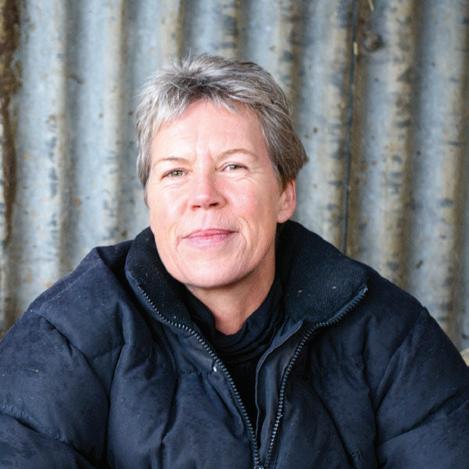
I’m especially delighted to welcome you to this spring edition of Living Earth, after such a long, wet winter! It really is a grind on the farm when everything is constantly soggy, though we are lucky compared to many people in lower lying regions who have had to contend with appalling flooding. Finally, the days are longer, and we hope to get animals back out into the fields soon.
One highlight on the farm this year has been the birth of our first pedigree Angus calf. Each year, we buy in bulls to run with the dairy cows, so my daughter and son-in-law who largely run the farm now, have decided we should start breeding our own. That way, there’s less risk of disease, and the young bulls will be completely adjusted to our system.
The other excitement over the winter was the announcement of the new Sustainable Farming Incentives (SFI), which will provide a much-needed 10% funding increase for nature-friendly farms. One of the things that the Soil Association has been advocating for is the introduction of an agroforestry option, and along with several other improvements, this is due to be established this summer. We know all the benefits of farming with many more trees, and we also know that lots of farmers are keen to give this a go, so now they will be helped to do so.
This spring, the Soil Association is calling for an end to the pollution from intensive poultry farms that is destroying the River Wye. More than 20 million chickens – 25% of the UK’s total – are farmed in the River Wye catchment area at any one time. The run-off from these farms is causing algal blooms, depleting biodiversity and ultimately destroying the river. You can learn more about the Soil Association’s campaign on p6, as well as how the community has pulled together to protect their river on p10
Also in this issue, we update you on our mission to make organic produce affordable, available and accessible for all (p20), and outline how we’re supporting farmers to get the most out of the upcoming General Election (p22)
I hope you enjoy this issue of Living Earth. As ever, please do get in touch with us with any comments or queries – we love hearing from you.
P.S. Our AGM will be held online again this year to allow as many people as possible to attend. It will be held on 7th November at 6:30pm. We will be in touch with more details in the coming months.

Helen
Browning, CEO and organic farmerIssue: 273
Without your dedication and generosity, our mission to create a better world for wildlife, nature, and people would simply not be possible. We’ve achieved so much together in the last 75 years, and so far, 2024 has been no different. Here are our highlights!
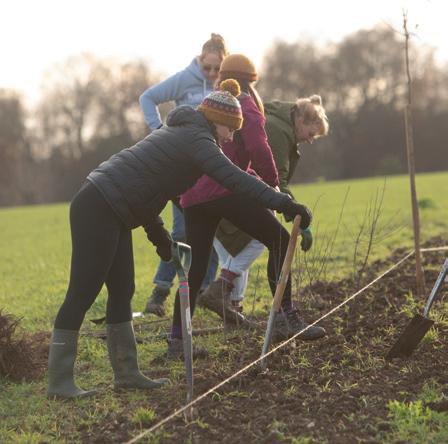
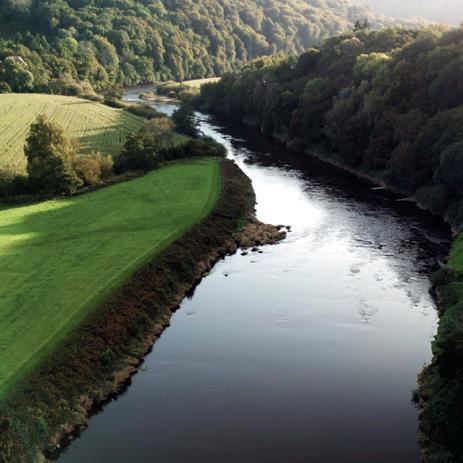
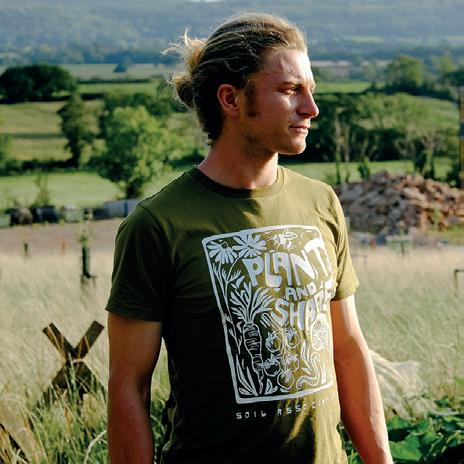
At Woodoaks Farm, we’ve been working hard to rebuild our vital hedgerows. With the help of kind supporters like you, we planted 2,000 metres of hedges at Woodoaks last year. And this year, you’ve already helped us plant another 600 metres
These hedgerows will bring endless benefits to wildlife. We’ve already seen Little, Barn and Tawny Owls return to the farm, along with other small animals and insects.
Together we can end the pollution from industrial chicken production, and help bring our rivers back to life. Thanks to you, we’ve launched our campaign to tell the Government that we don’t want more intensive poultry units and we want to see nature friendly farming methods. With enough voices, we can make sure they hear us.
We’ve launched a new line of clothing, inspired by 75+ years of Soil Association history. With retro designs plucked from our archive, they are a fantastic way to support our work and inspire others to do the same!
Made from soft, Soil Association certified organic cotton, our t-shirts, jumpers and tote bags are produced sustainably using renewable energy and printed in the UK. And the profit raised each time you purchase one of our products goes to support our work.
You can buy our Soil Association clothing at: soilassociation.co/merch
To everyone who made this possible, we can’t thank you enough.
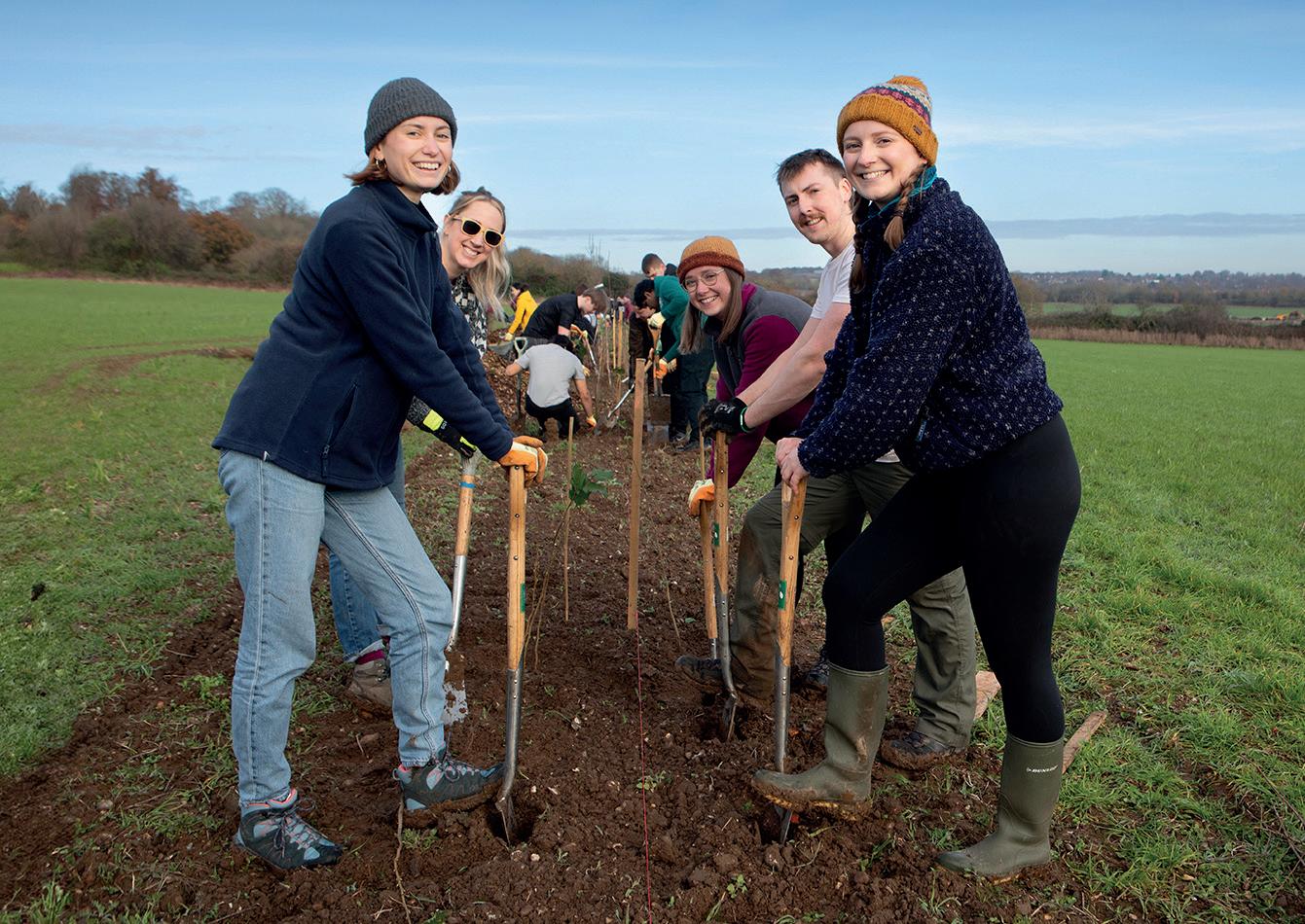
Donate:
Donate to our current campaign! We’re asking the Government to stop killing our rivers, by introducing a moratorium on new intensive chicken farms and supporting nature-friendly practices. Read more on p6.
Increase your monthly gift to the Soil Association: Members like yourself are the lifeblood of the Soil Association. Your support means a lot, and even a small increase in your monthly gift to us will go a long way in amplifying our impact on our planet and the wildlife that relies upon it.
Leave a gift in your Will:
The best thing you can do to support a nature-friendly future is to include the Soil Association in your Will. There’s still so much more to be done and knowing we can rely on these special gifts in the future means we can continue protecting our natural world for future generations.
Request our Guide to Gifts in Wills to find out more.
If you’re interested in making an even bigger impact, please do phone us on 0300 330 0022 or pop us an email at memb@soilassociation.org
Pollution from industrial chicken farming is killing The River Wye and many more of our beautiful rivers. Our mission is to end the growth of destructive intensive poultry units, stop this pollution and help farmers move towards more nature-friendly methods that can bring our precious rivers back to life.
Over many years, local people have noticed ever-growing pollution in the River Wye, one of our most beloved and historic rivers. Then, in 2020, 140 miles of the river turned a disgusting green colour. This stagnant ‘pea soup’ smelled revolting, and what used to be clean rocks on the riverbed were covered in green slime.
The River Wye was being slowly suffocated. Without action, it will soon be declared dead.
The River Wye is a designated Special Area of Conservation, an important site for the protection of natural habitats and wildlife. Despite this, the surrounding
land has been flooded with intensive poultry units in recent years to meet rising consumer demand for cheap chicken.
These units, each housing 40,000 or more chickens, produce thousands of tonnes of phosphate-rich manure every year. Spread as fertiliser on nearby fields, it’s far more than the land can absorb. The result is that excess amounts of phosphate run off into the River Wye, causing huge blooms of green algae to grow. These block out the sunlight and starve plants, invertebrates and fish of oxygen, killing the ecosystem that provides food and shelter for wildlife like otters, eels and kingfishers.
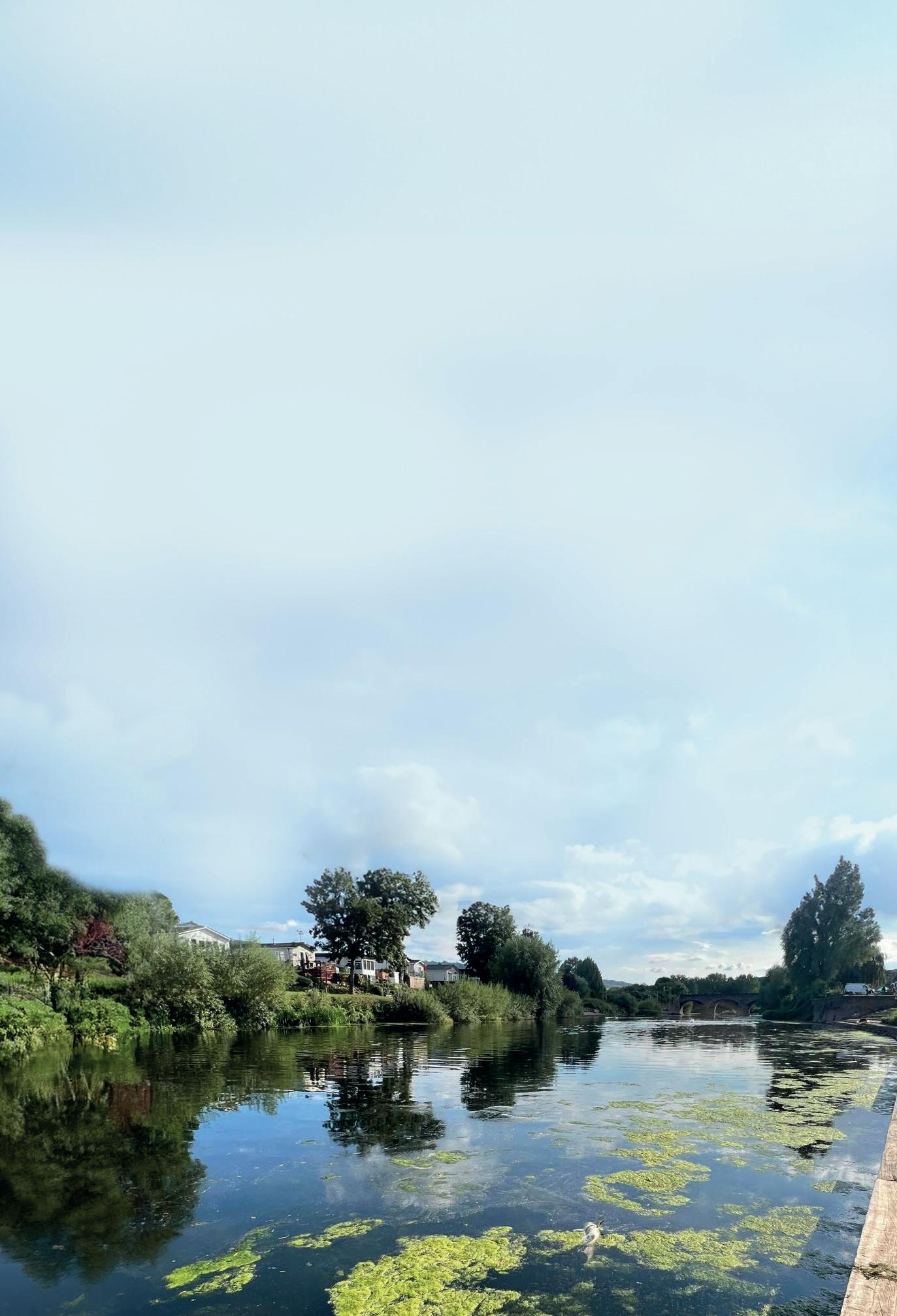
To know that a river is dying within the lifetime of your children... I can’t tolerate it.
Nicola, who lives near the River Wye, is one of many people who have looked on in horror at the decay of their local river. “This was a beautiful river that people remember swimming and paddling in,” she says.
“It’s what’s happening below the surface, a hidden killer. Agricultural pollution is far less visible than sewage where you can see it coming out of a big outfall pipe. With the intensive poultry industry, the pollution in the soil just leeches into the river. It’s quite sinister.”
The Environment Agency has reported ‘unacceptable levels’ of damaging phosphate in over half of English rivers. All across the country, from Powys to Norfolk to Yorkshire, many of our most treasured rivers are at risk of extinction from an increase in intensive poultry units.
Together with you, our supporters, we’re taking action to stop pollution killing our rivers, by pressuring the Government to end the construction of intensive, river-polluting chicken farms.
We’re determined to help farmers move away from the intensive poultry industry that’s controlled by huge conglomerates and supermarkets. Adopting more nature-friendly, sustainable ways of farming will not only protect our rivers from agricultural pollution, it will help transform chicken welfare, too. Instead of being packed into vast sheds where they have little room to move or express themselves, chickens can be raised in a more natural, humane environment that respects the soil.
We’re sending a message to the UK Government: Stop killing our rivers!
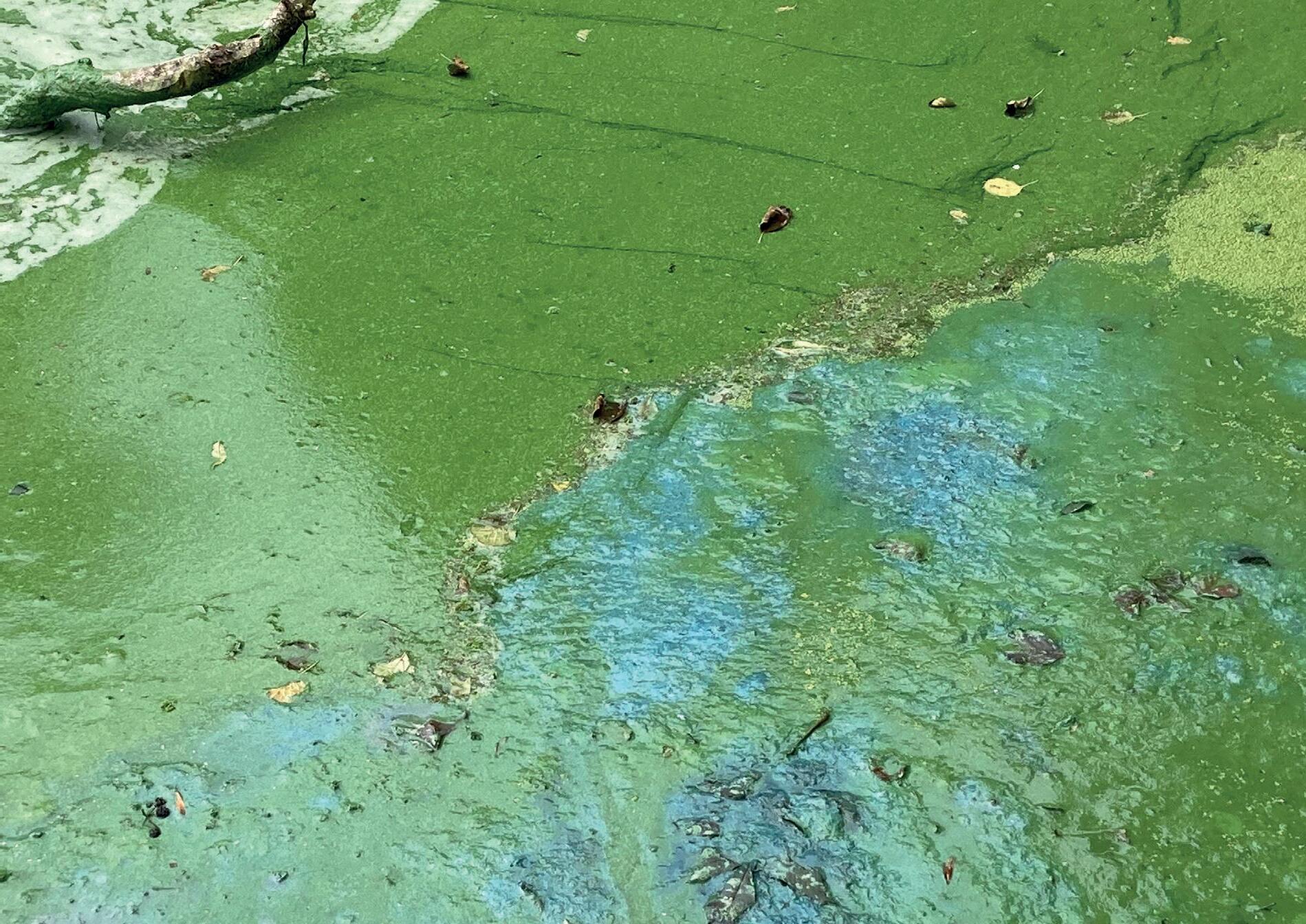
We’re determined to end the appalling destruction of the Wye, prevent it happening to other rivers, and create a world where nature is respected, protected and nurtured.
To donate to our appeal to stop pollution killing our rivers, go to soilassociation.co/pollution or phone 0300 330 0022
How your donation can make a difference
£75 could help lobby the Government to cut chicken consumption to more sustainable levels, by phasing out the serving of industrially produced chicken in schools and hospitals
£50 could help farmers leave behind the intensive poultry industry and adopt more nature-friendly farming methods that prioritise the welfare of animals
£25 could help pressure the Government to implement a ban on new intensive poultry units that produce thousands of tonnes of riverkilling phosphate

Chicken feed containing phosphorus is delivered to the industrial poultry units. This then becomes phosphate in the chicken's manure.
An estimated 20 million chickens are being farmed in intensive poultry units in the River Wye catchment area at any one time.
The chickens produce vast quantities of phosphate-rich manure that is spread on nearby fields as fertiliser. This stimulates growth of crops but is being applied in much higher concentrations than is needed.
The already saturated land can’t absorb all of the excess phosphates, so they leach into nearby rivers and waterways.
The phosphates ‘fertilise’ the algae in the river causing huge algal blooms,
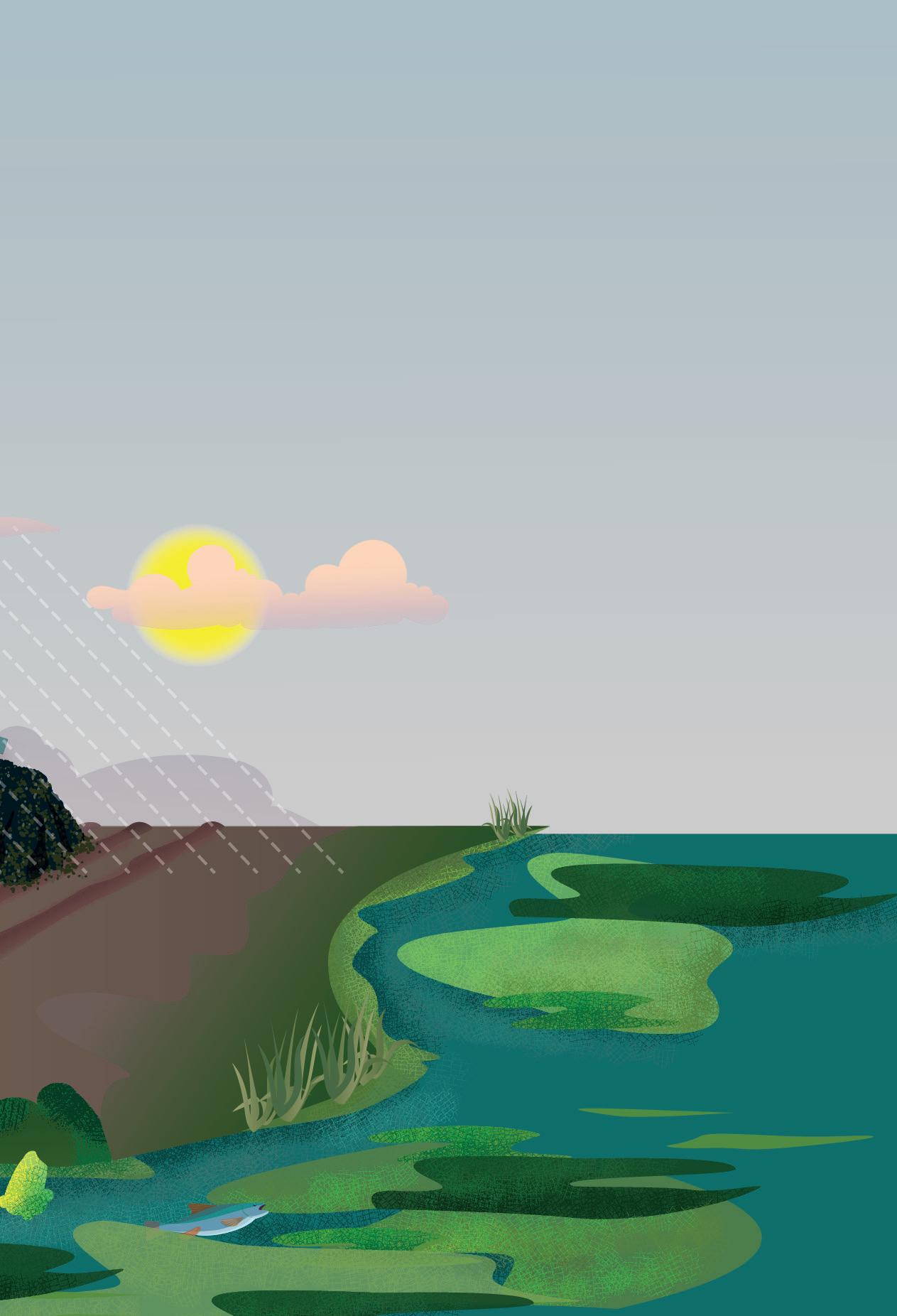
Chicken manure (high in phosphate) is spread on local land and leaches into rivers.
Natural plants die, starving river life.
blocking sunlight and removing oxygen from the water. This kills other plants and animals in the river.
Other wildlife that relies on the river for food and shelter, including kingfishers, otters, dippers and water voles, struggle to survive. The river is close to ecological collapse.
Agricultural pollution is the main source of pollution in the River Wye, a protected river. Together, let’s tell the Government that we don’t want more intensive poultry units, we want nature-friendly farming methods.
Get involved:
Sign our petition
soilassociation.co/rivers_le
Make a donation
soilassociation.co/pollution
Excess phosphate in the river causes algal blooms which remove oxygen from the water and block out sunlight.
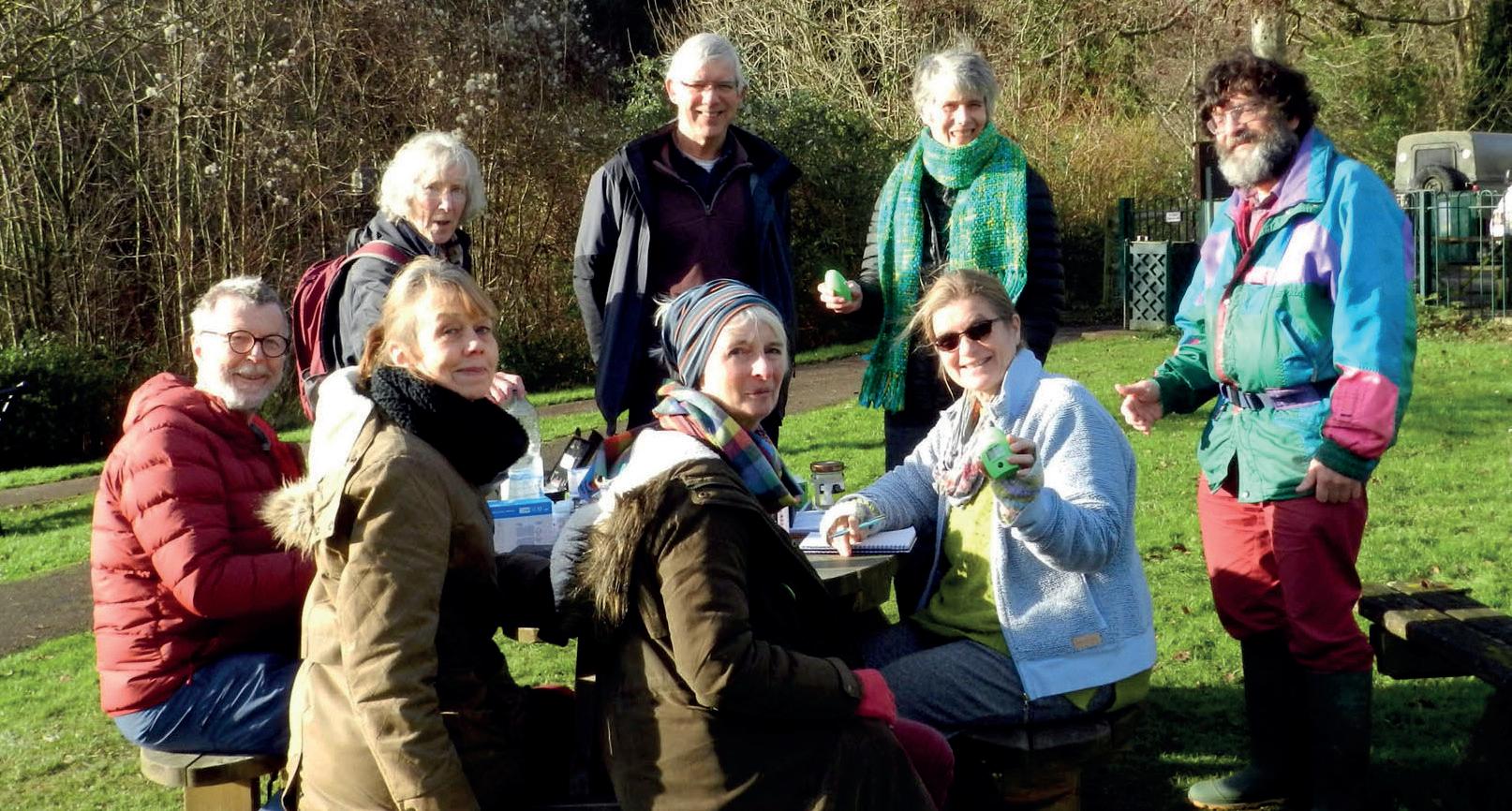
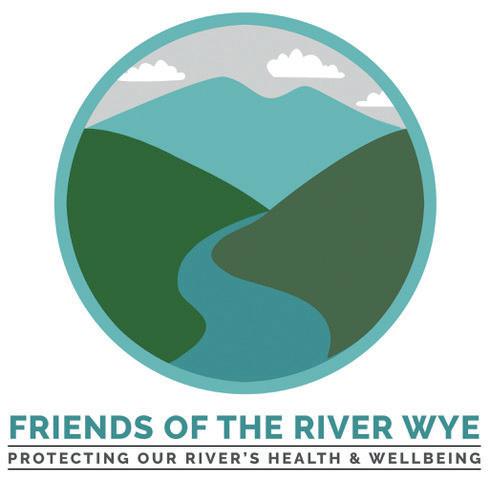
In July 2021, a group of local people set off on a monthlong pilgrimage along the River Wye. Pure water was collected from the source in Plynlimon and carried by a succession of walkers to where it flows into the Severn Estuary, accompanied by swimmers, canoeists and paddleboarders, through areas of great pollution.
Mike Dunsbee, who has lived alongside the River Wye for over 20 years, met the group on their journey and was inspired by their determination to take action.
“I’ve walked along the banks of the River Wye many times, and being retired I was keen to make myself useful in the fight for a cleaner river. Alongside Nick Day, I set up ‘Friends of the Lower Wye’ (now ‘Friends of the River Wye’) to highlight the issues of pollution in the river.”
The organisation’s mission is to ensure that the River Wye and surrounding area can be enjoyed by all, with the ultimate aim of having a clean, pollution-free, healthy river and valley. The group has engaged with key authorities, governments, farmers and local communities, even setting up a citizen science programme to monitor water quality.
Crowfoot flourishing in 2017. By 2022 it has all died.
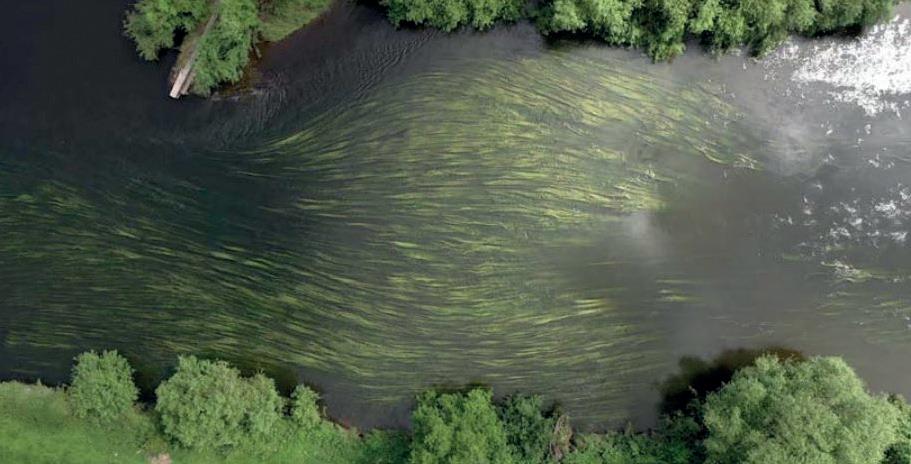
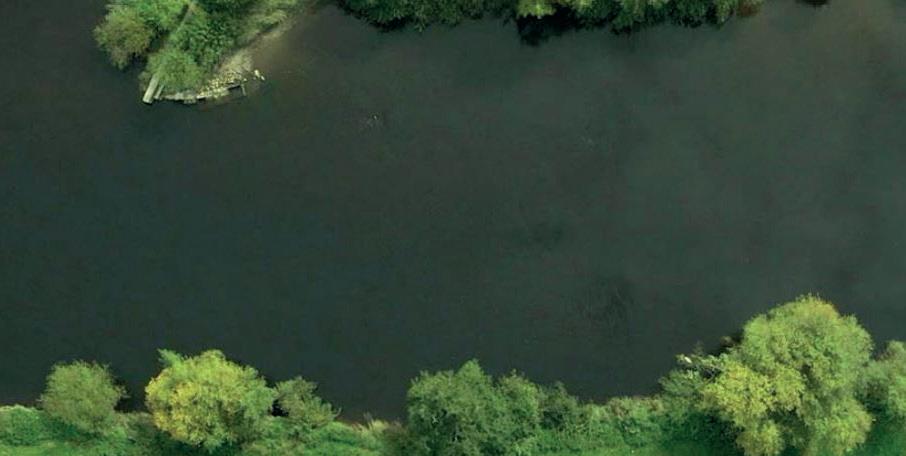
The community has pulled together to support this endeavor, with over 300 volunteers testing water across 100 sites. These citizen scientists are designated a spot along the river and tributaries where they test for phosphate and nitrate levels every week and share their findings with organisations including the Environment Agency.
Mike said: “It’s been wonderful for local people to reconnect with and become guardians of their local rivers. Many of us have seen the health of our river deteriorate over time, we’ve seen biodiversity decline, harmful algal
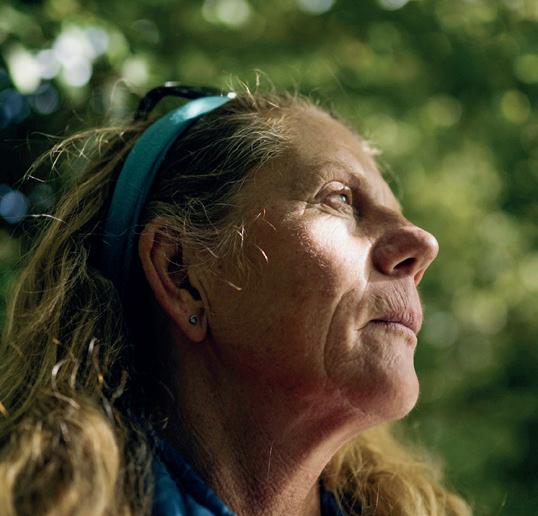
Angela Jones, otherwise known as the ‘Wild Woman of the Wye’, is an environmental activist and keen swimmer. Angela has been swimming in the river for decades but noticed a sharp decline in water quality 6 years ago when intensive poultry units started popping up in her area.
blooms, and we’re no longer able to swim in the river due to pollution. By getting involved in the testing programme, individuals are standing up and saying:
We want a better river system.
Other UK rivers are at risk from agricultural pollution, causing wildlife populations to suffer and putting community health and wellbeing at risk. So please, if you can, consider donating to our appeal to stop pollution from intensive chicken farming adding to the pressures killing our rivers.
I don’t recognise the river anymore. When I swam, I used to see salmon and otters, now there’s nothing. Swimming is becoming more and more difficult, and if I do swim my eyes and throat are sore when I get out. We aren’t scaremongering, pollution really is strangling the River Wye.

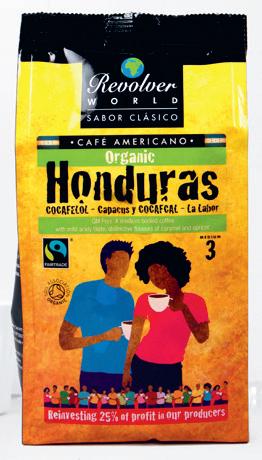
ZAYTOUN ORGANIC EXTRA VIRGIN OLIVE OIL
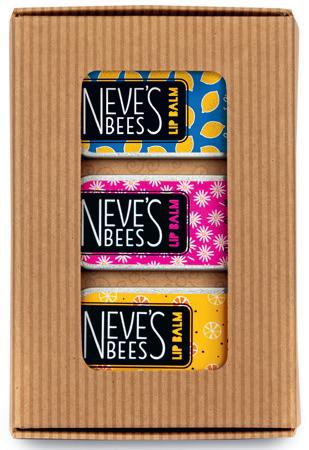
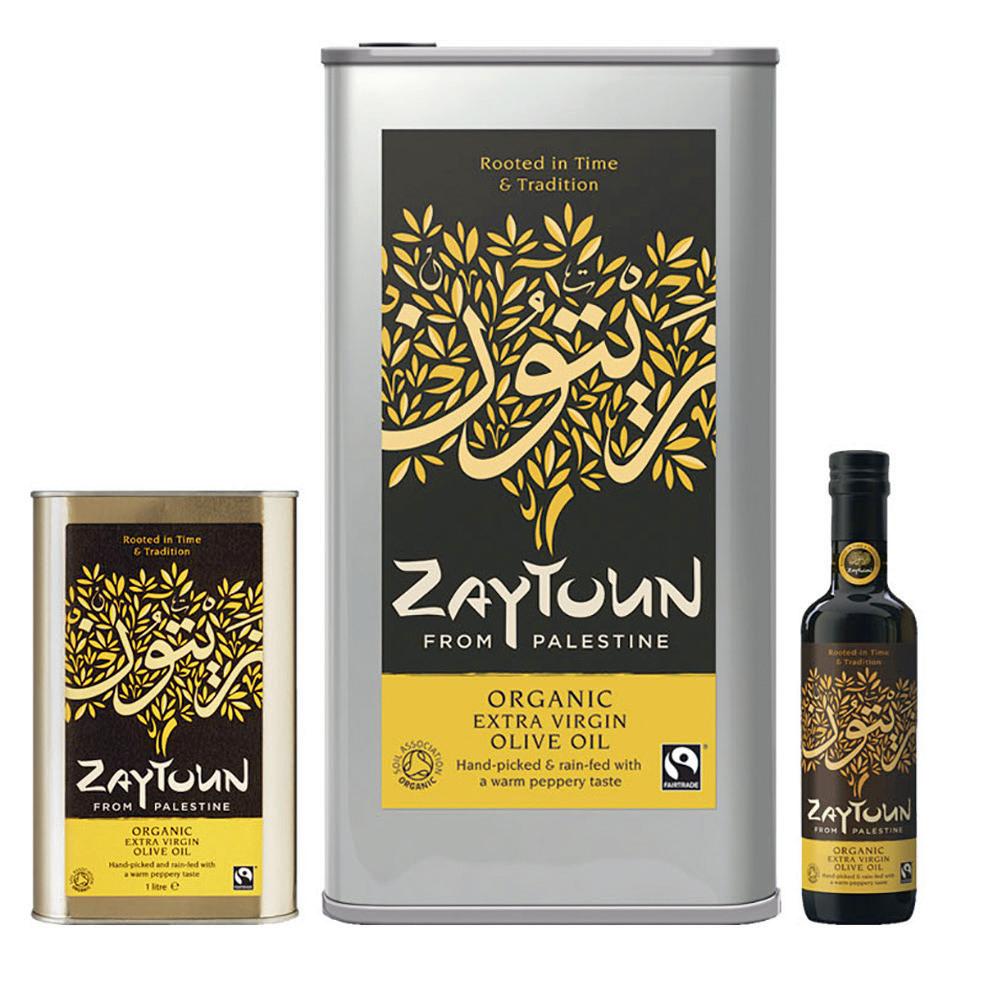
RUBBERISED COIR SEEDLING POTS, 6CM-8CM
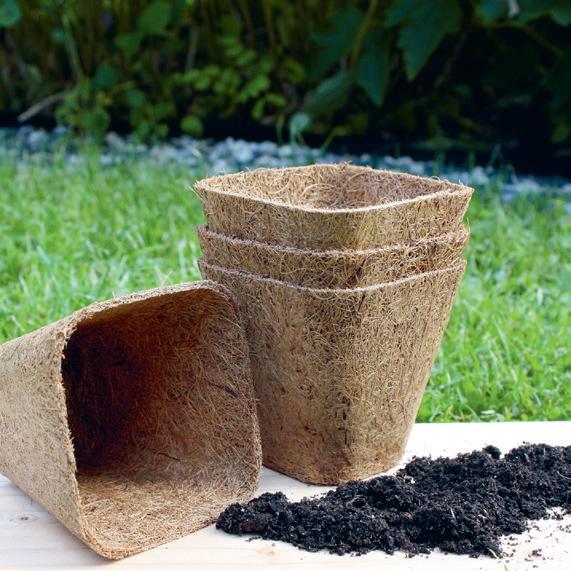

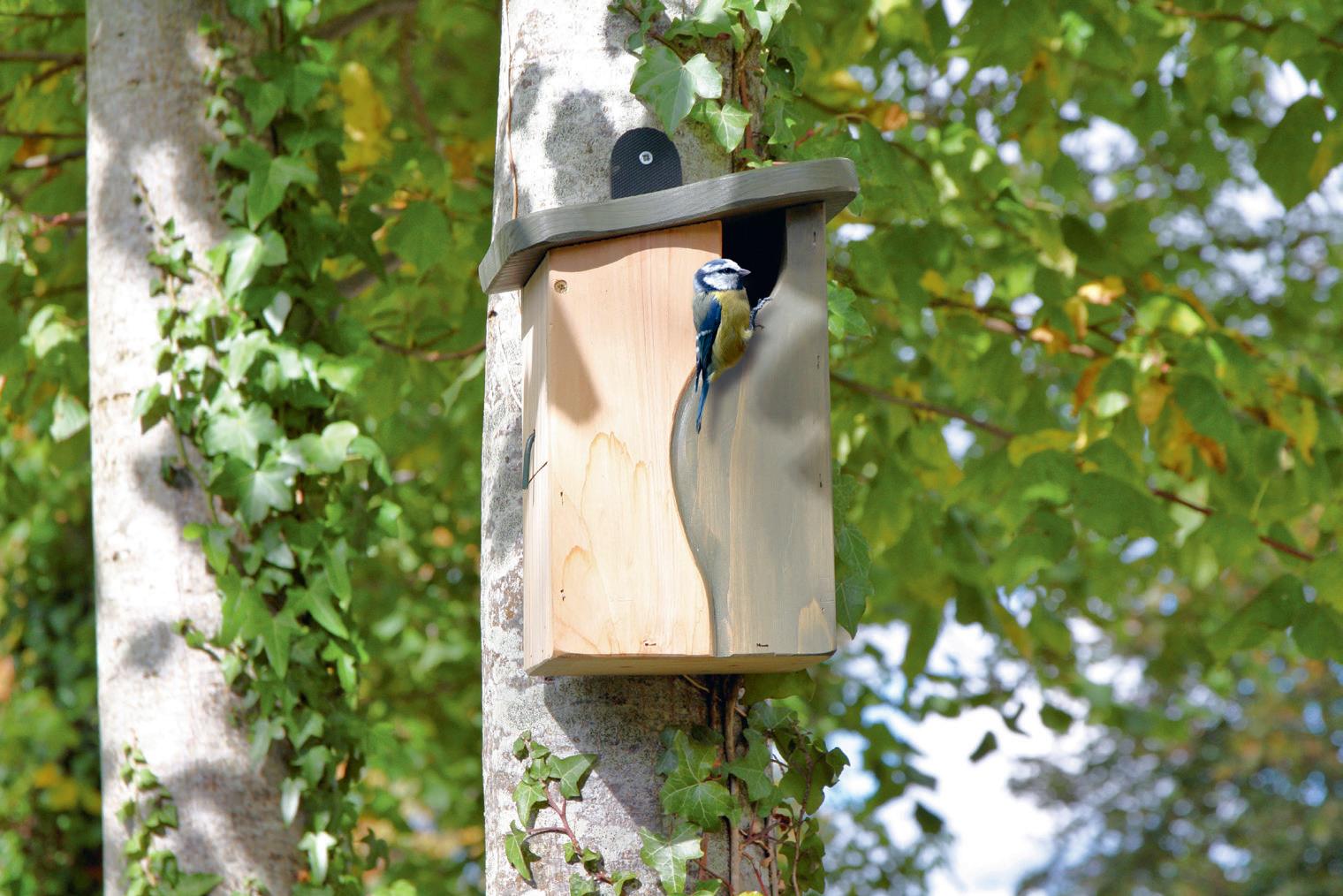
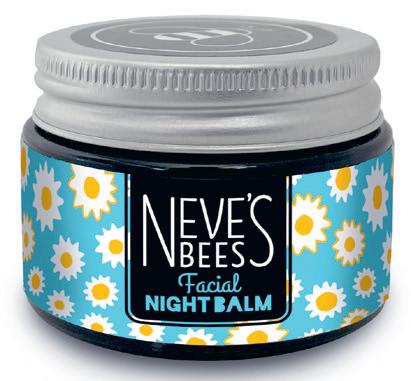

Ask any gardener what they would look for in their ideal plot, and, along with adequate light, they would certainly specify fertile soil. Fruit and veg growers, in particular, are always looking for ways to improve their soil, in order to maximise their yields and flavours, and to promote the health of their plants.
Composting is my activity of choice when it comes to bringing soils alive, and I absolutely love doing it! As well as running a community market garden, I run the weekly ‘Compost Club’ at Woodoaks Farm – an open session where people bring all manner of compostable items from their homes, local cafes and stables to a dedicated patch on the farm. At Woodoaks, we
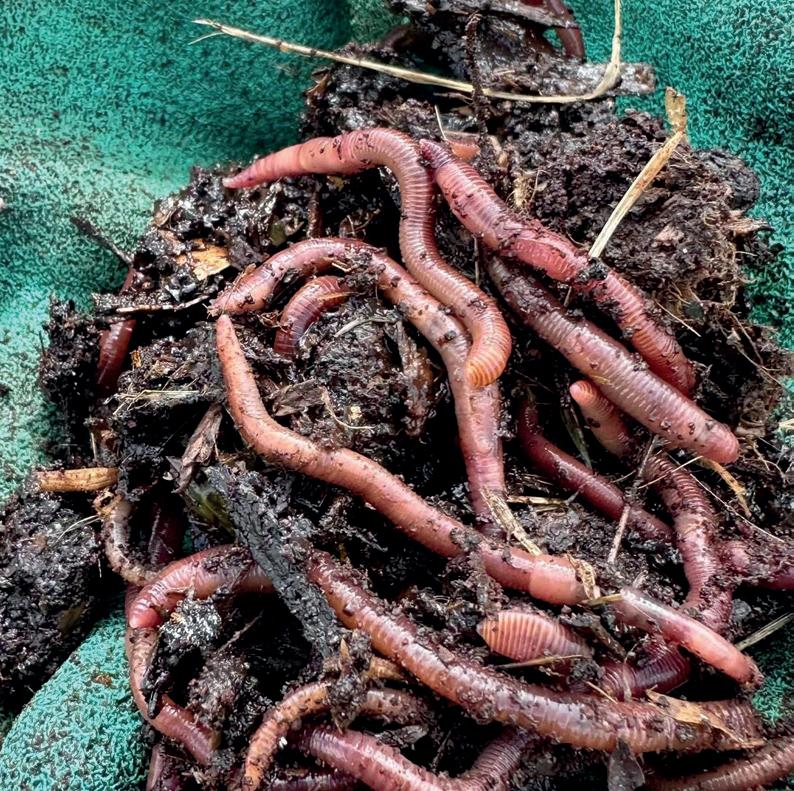
distribute the vast quantities of compost to local community groups as well as offering some to our onsite growers.
The Woodoaks compost club has been a wonderful source of community cohesion at next to no cost. A physical and joyful hour full of purpose, followed by a companiable cuppa, reaps huge rewards and contributes to the strong team spirit found on the farm.
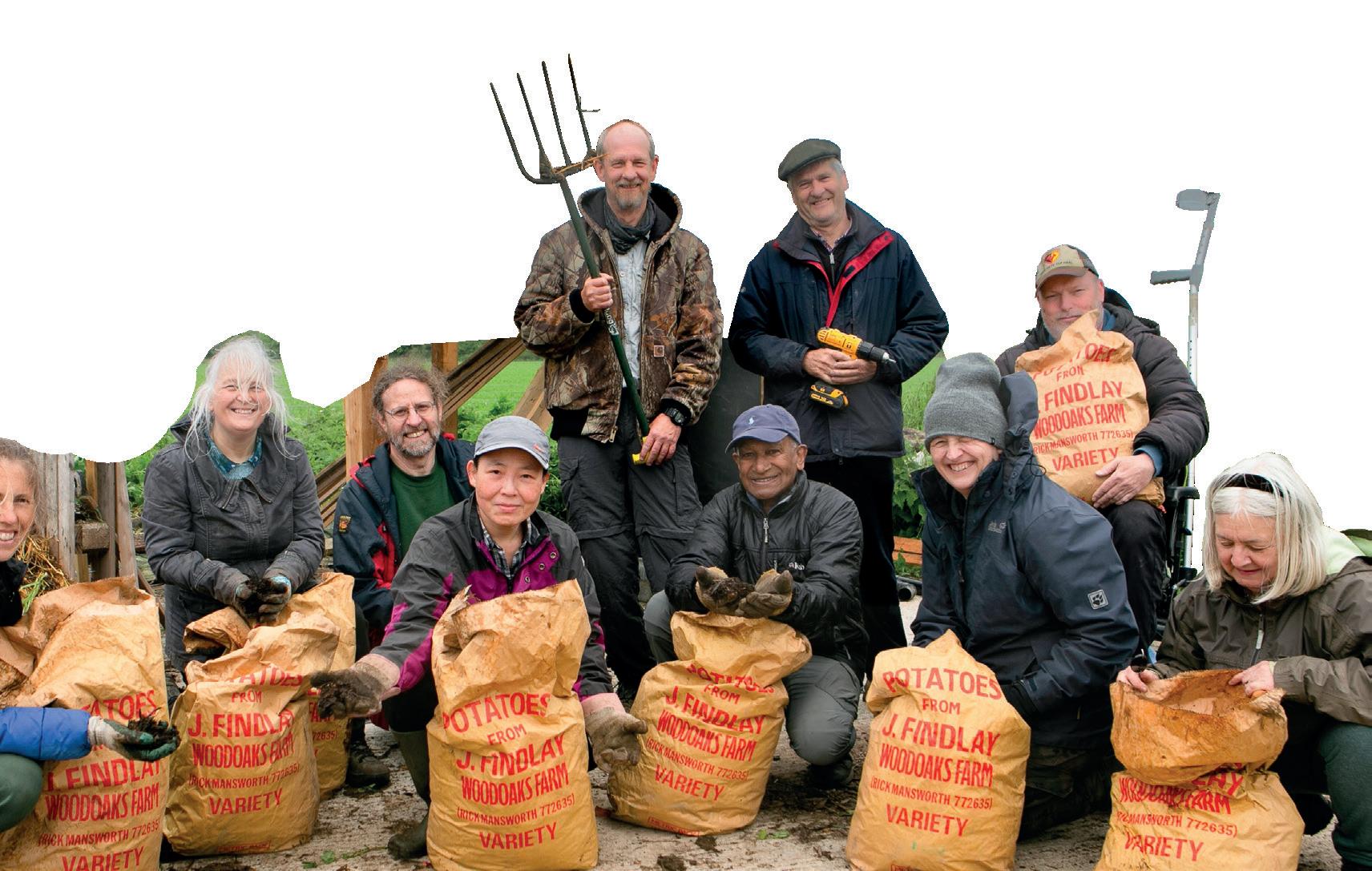
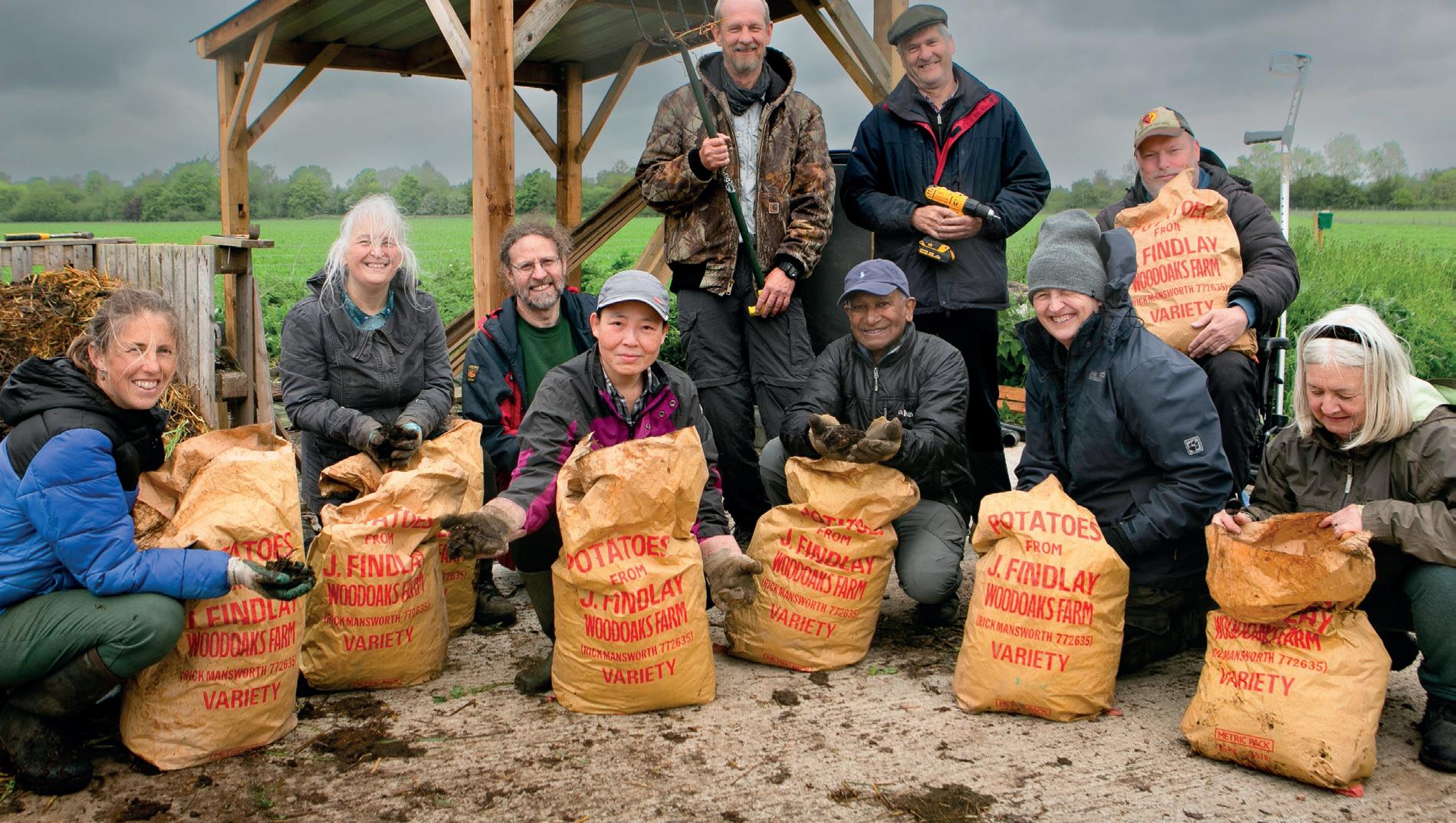
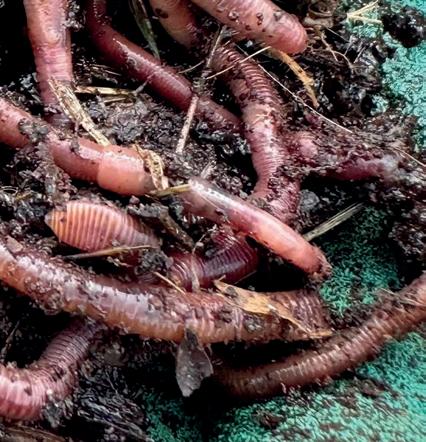
For those new to composting, there are five key requirements.
Browns:
This is your carbon. Woodchip, sawdust, shredded card or paper, straw or hay are all great sources of carbon.
2 Greens:
These are the fresh, nitrogenous materials – grass cuttings, fruit and veg peelings, animal manures and coffee grounds are good examples.
3 Surface Area:
Whilst not essential, a high surface area to volume ratio will speed up your composting – we know this instinctively – a log will take a lot longer to decompose than the same volume of wood in the form of sawdust.
4 Moisture:


All living things need water in order to respire, and many need it in order to move (bacteria are certainly in this category, and worms, although they can move over dry surfaces, really object to dry conditions). We have installed a rainwater-catching roof so that we can water our heaps in times of dryness – this needs to be done at the stage of assembling the heap – in my experience, watering further down the line is ineffective.
5 Oxygen:
This is completely essential and is often where people have gone wrong when they bemoan their stinking and fetid heap. Your heap is populated by trillions of microorganisms, all needing oxygen in order to respire. A heap with lots of nitrogenous material is like an all you can eat buffet for these organisms, and
as a result, they respire very quickly, using up the available oxygen (it is the heat of this respiration, an exothermic reaction, which causes heaps to heat up!) At this point, anaerobic bacteria start to dominate, and they generate the unpleasant smells you may associate with bin lorries. These bacteria are not what you want to be adding to your soils, so it is imperative to keep your heap well aerated.
All this may seem like a lot of work, but the input:output ratio is stunning! For a small amount of regular attention, you will be rewarded not only with wonderful, life giving compost, but also the knowledge that you are building soils that can sequester carbon. You are providing the optimal conditions for healthy plant growth, making a political statement that says you will not treat the earth as disposable or take more than your share, connecting with the outdoors, keeping your body and soul in good condition. And, if you are lucky enough to do this with others as I am, making friends.
What about citrus? Stick it on your heap! It’s not the worms’ favourite, but it will turn into compost, especially if chopped up into small pieces
And Eggshells? Eggshells are a great addition that prevent the heap becoming too acidic. However, they can attract rats if not baked first, and they are very very slow to break down. I bake mine when the oven is on anyway, then bash them up with a rolling pin. I appreciate this is extreme dedication to composting!
Please do get in touch with any composting questions – I would be genuinely delighted to help:
Floragarveygardening@icloud.com, or Flora Garvey Gardening on Instagram.
We are restoring a piece of land, creating a biodiverse habitat for humans and wildlife to thrive and showing the impact a regenerative approach can have in an urban context, but also on our health, society and planet as a whole.
Josephine Marchandise is Head of the Creative and Regenerative Kitchen at OmVed Gardens, an organic garden, kitchen and educational space in North London. For those in the farming community, you may recognise Josephine from Oxford Real Farming Conference, where she spoke about how she prioritises sustainability in both the kitchen and garden, in a session chaired by Hugh Blogg, Horticultural Advisor at the Soil Association.
In this article, Living Earth has invited Josephine and Hugh to continue their conversation around nature-friendly gardening, and how this has changed her experience as a chef.
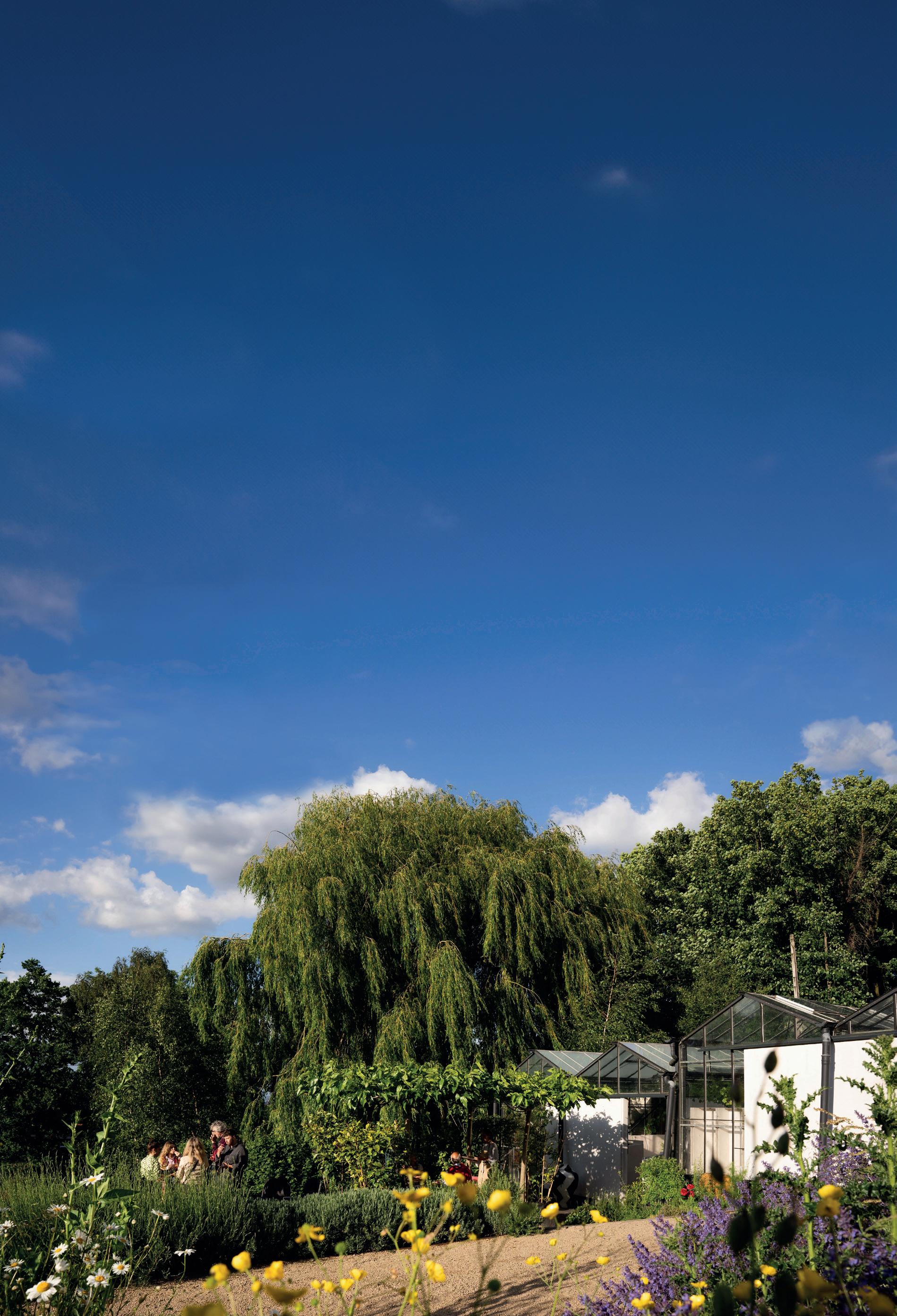

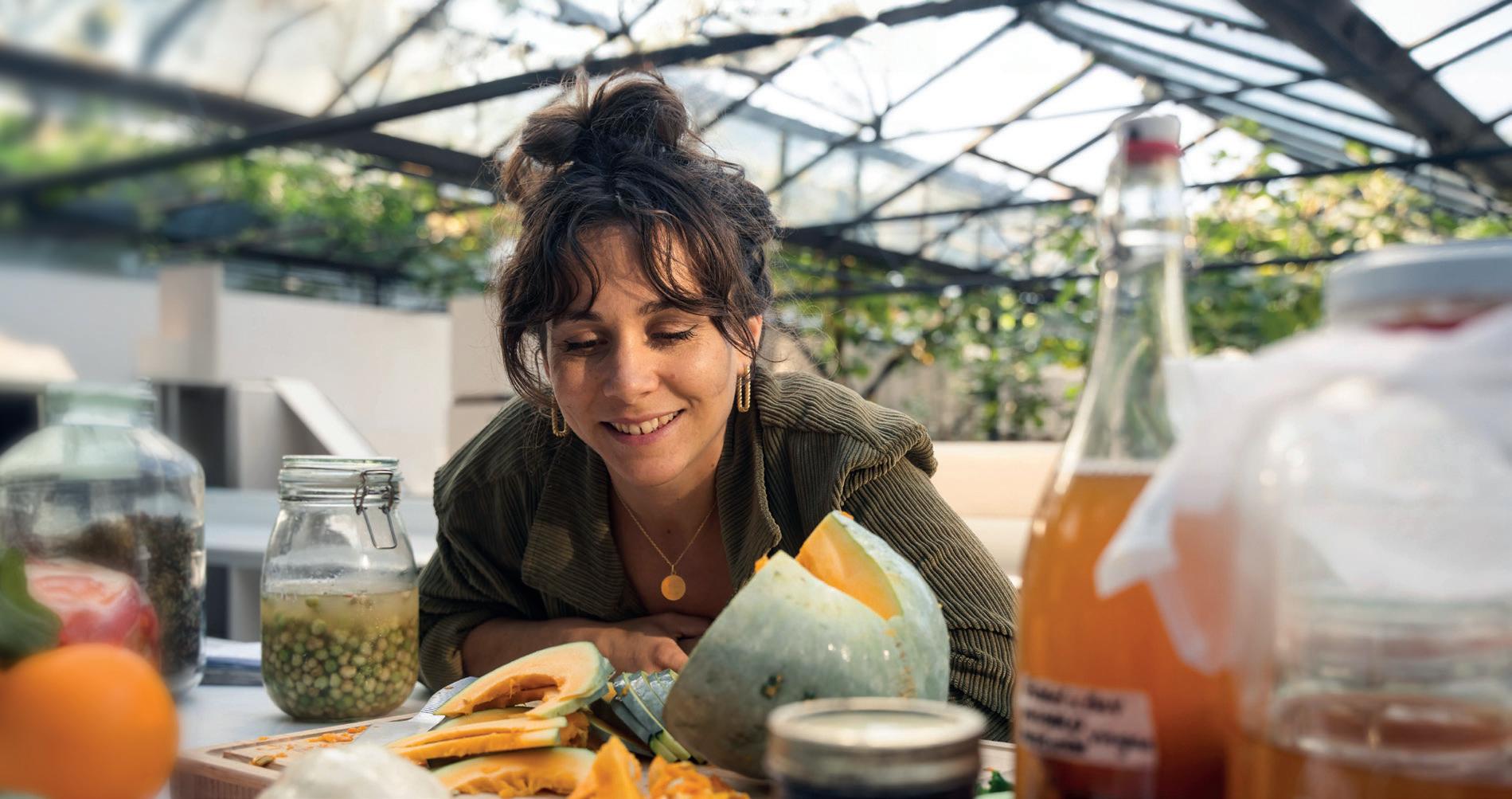
Hi Josephine, good to see you again and thank you for joining us. Can you start by telling our readers a little about yourself and OmVed?
Hi Hugh, absolutely! I’m Josephine Marchandise, Head of Kitchen at OmVed Gardens.
I’ve been involved in OmVed for a few years now, both as a gardener and as a chef/fermenter, and in that time the space has been constantly evolving. We’re primarily a permaculture garden, growing food from around the world in sustainable, nature-friendly ways. But we also run events for the local community, from talks to workshops, and even seed swaps!
Amazing, OmVed is a real inspiration and prioritises a lot of areas that the Soil Association stands for – nature, health and community. Why do you think that’s important in a city like London?
As you know, London is a very urban area and it can be hard to access green spaces when living in the city. It’s really
important to us that humans are able to connect not only with nature, but also with their food and where it comes from.
But it’s not just about humans. We garden using organic, nature-friendly methods that prioritise sustainability, meaning that we’re able to create a haven for wildlife too.
And what are you doing in the garden to help wildlife?
We have made a series of conscious choices such as growing organically, saving seed, preserving, planting trees, nurturing bees, planting native species, creating wildlife corridors, saving water, reusing, recycling and composting.
We’ve also had some help from landscape gardeners to make our gardens beautiful, but more importantly practical. Much of our produce is grown in circular raised beds that protect them from slugs and snails, keep the plants warm, and retain moisture and warmth in the soil. These beds mean that we are able to save water and avoid adding chemicals.
That’s brilliant to hear and definitely something people could do at home! As the chef, how has gardening in this way changed how you cook?
It’s very different to the average kitchen as I’m involved in the whole process of growing and cooking the food. I usually start by taking a walk round the garden to see what’s ready for harvesting, then I can decide what to cook based on the garden.
As with many gardeners, the challenge is often using all the produce whilst it’s in season! I’m ‘allergic’ to food
waste, and that’s actually how I got into preservation and fermentation. I found that lots of crops were ready to be harvested but we didn’t have an event for another week, so I found ways to preserve the food in a way that brings out new flavours and textures, whilst also having lots of health benefits.
Fermentation defines our kitchen now, and I think it’s such a useful tool for gardeners who want to make the most of their produce and use it in more interesting ways.
You can find out more about OmVed Gardens at omvedgardens.com, or subscribe to their magazine, ‘Where the Leaves Fall’. Or follow them on Instagram @Omvedgardens
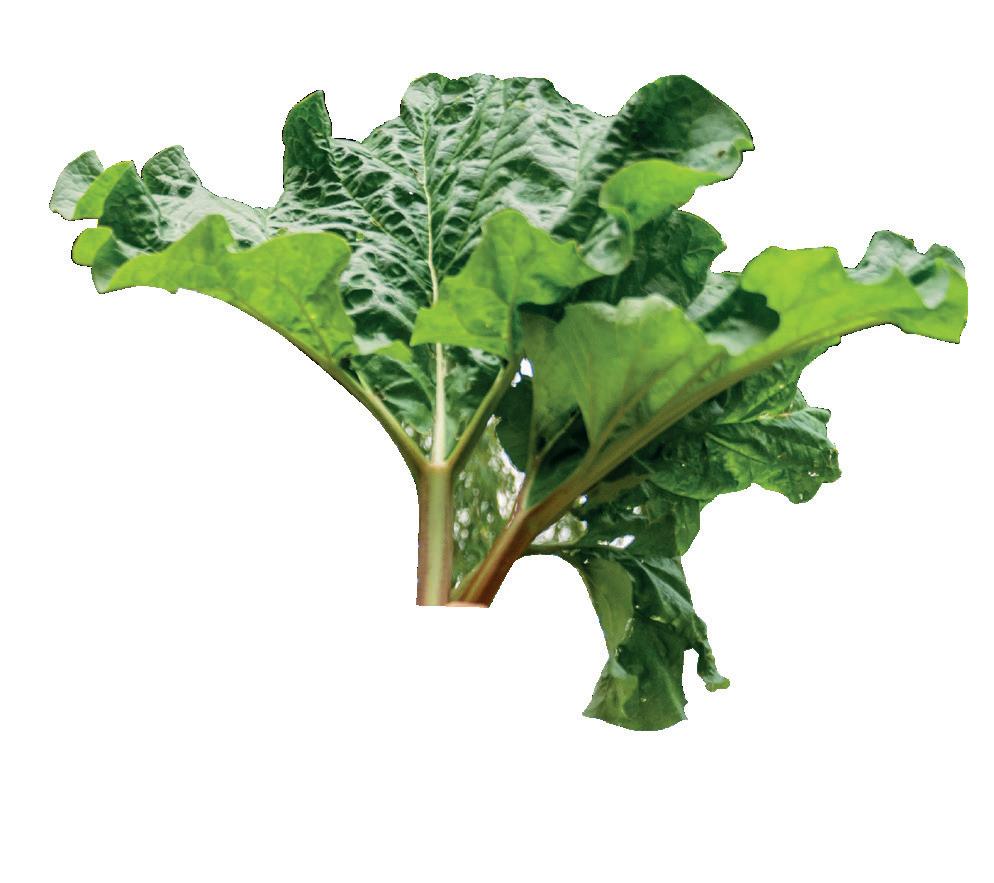
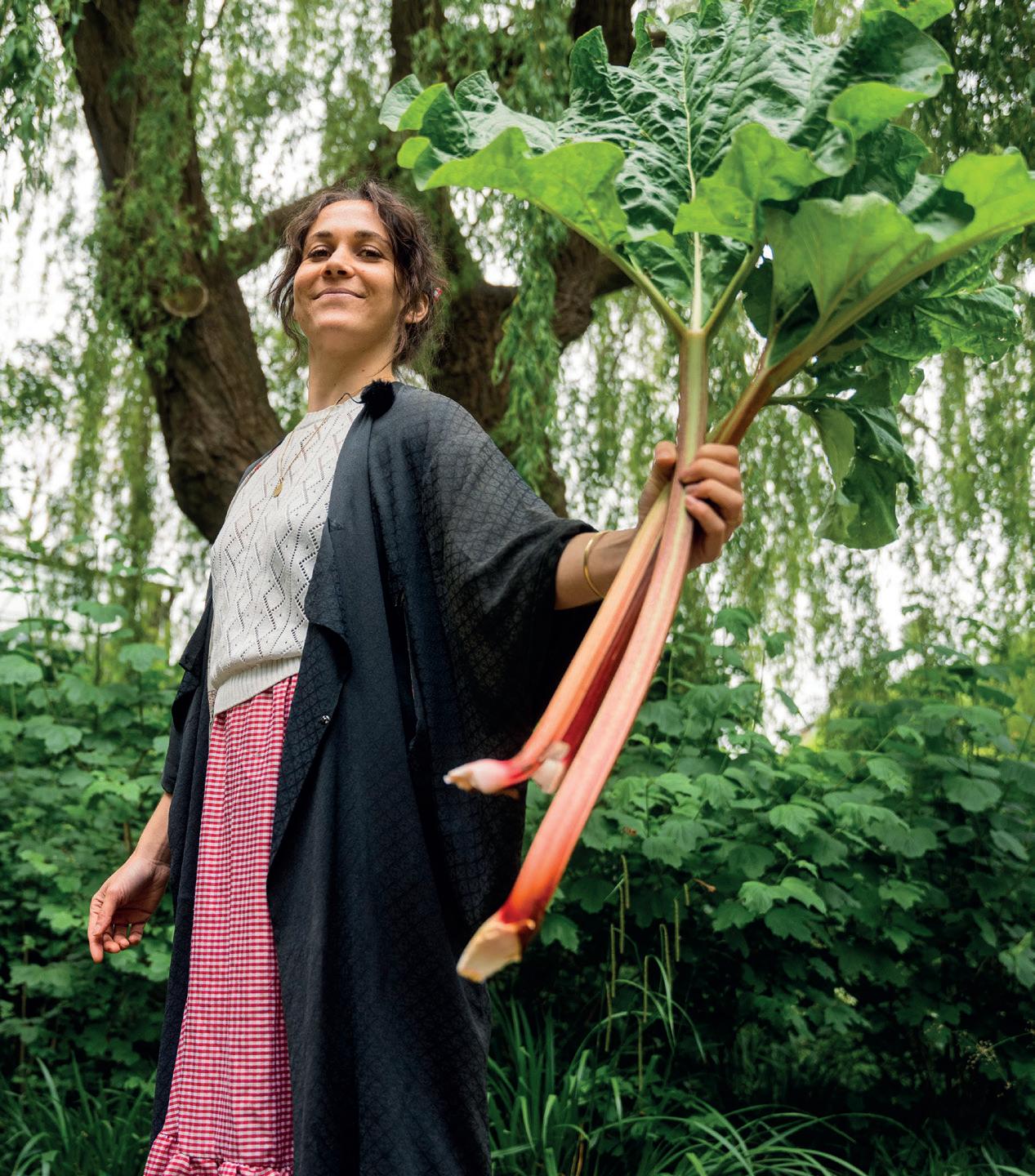
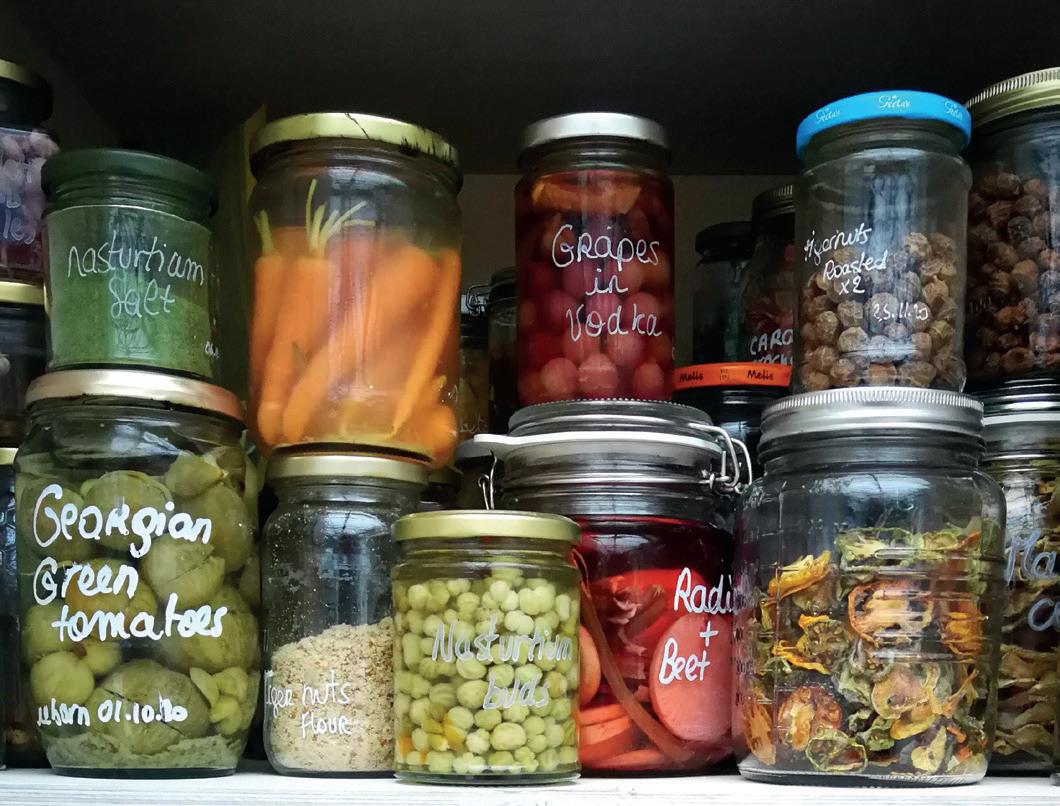
Josephine’s Favourite
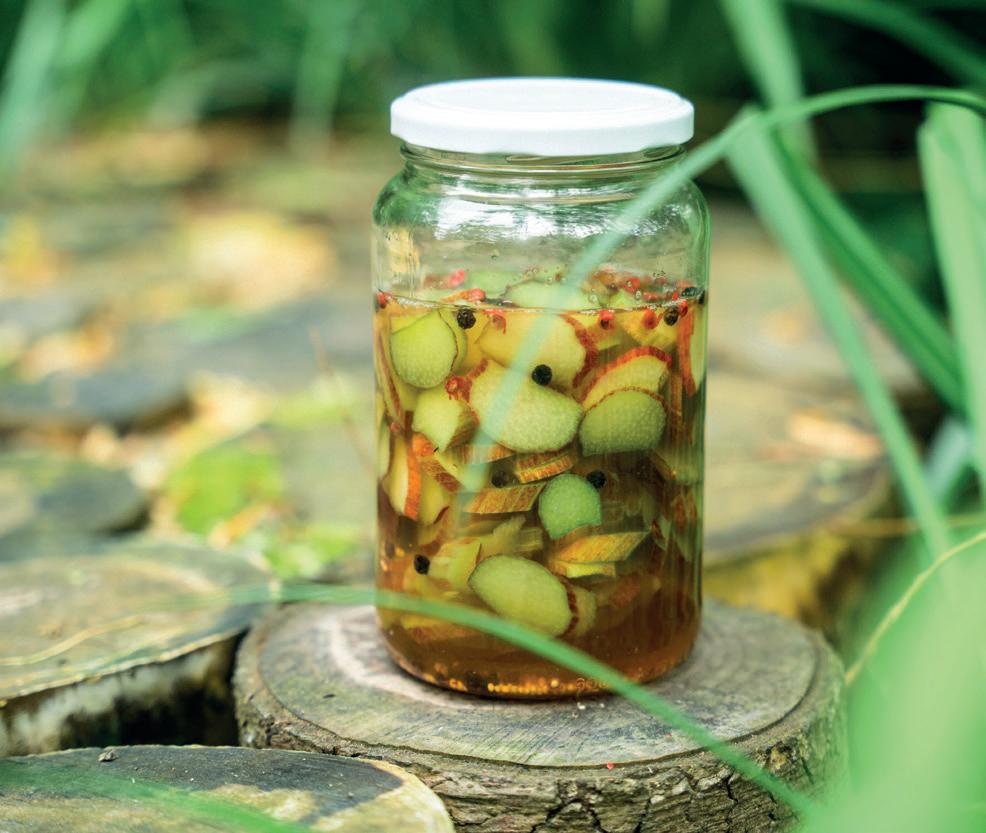
To inspire you to start preserving your excess produce this year, Josephine has shared with us one of her favourite recipes!
For a medium jar you will need:
• 200-400g rhubarb (depending on the stem size and thickness)
• Vinegar of your choice (I personally prefer apple cider vinegar)
• Red and black peppercorns
• Mustard and coriander seeds
• Star anise and ginger (optional)
• Salt and sugar
Method:
1 Wash and finely slice your rhubarb.
This is the first pickle of the year I’m always excited to make; using the majestic British rhubarb. It is an unexpected choice, but this rhubarb pickle is deliciously zingy and easy to make for yourself or as a gift. It can be enjoyed as a condiment, and it pairs well with cheeses, green salad, beetroot and fennel
2 Sterilise a glass jar with hot soapy water and pop in your sliced rhubarb with the spices.
3 Fill half of the jar with filtered water and the other half with vinegar, a teaspoon of sugar and salt, shake well until it dissolves.
4 Ensure the liquid covers the rhubarb and leave a small gap between the liquid and lid.
5 Place in the fridge, your pickle should be ready after a few weeks.
6 Will keep up to 4-6 months (unopened).
In order to keep the crunchiness of the rhubarb add an alkaline leaf on top (oak, vine, raspberry etc.) otherwise the texture will become soft and mushy over time.
The flavour gets better with time so be a little patient!
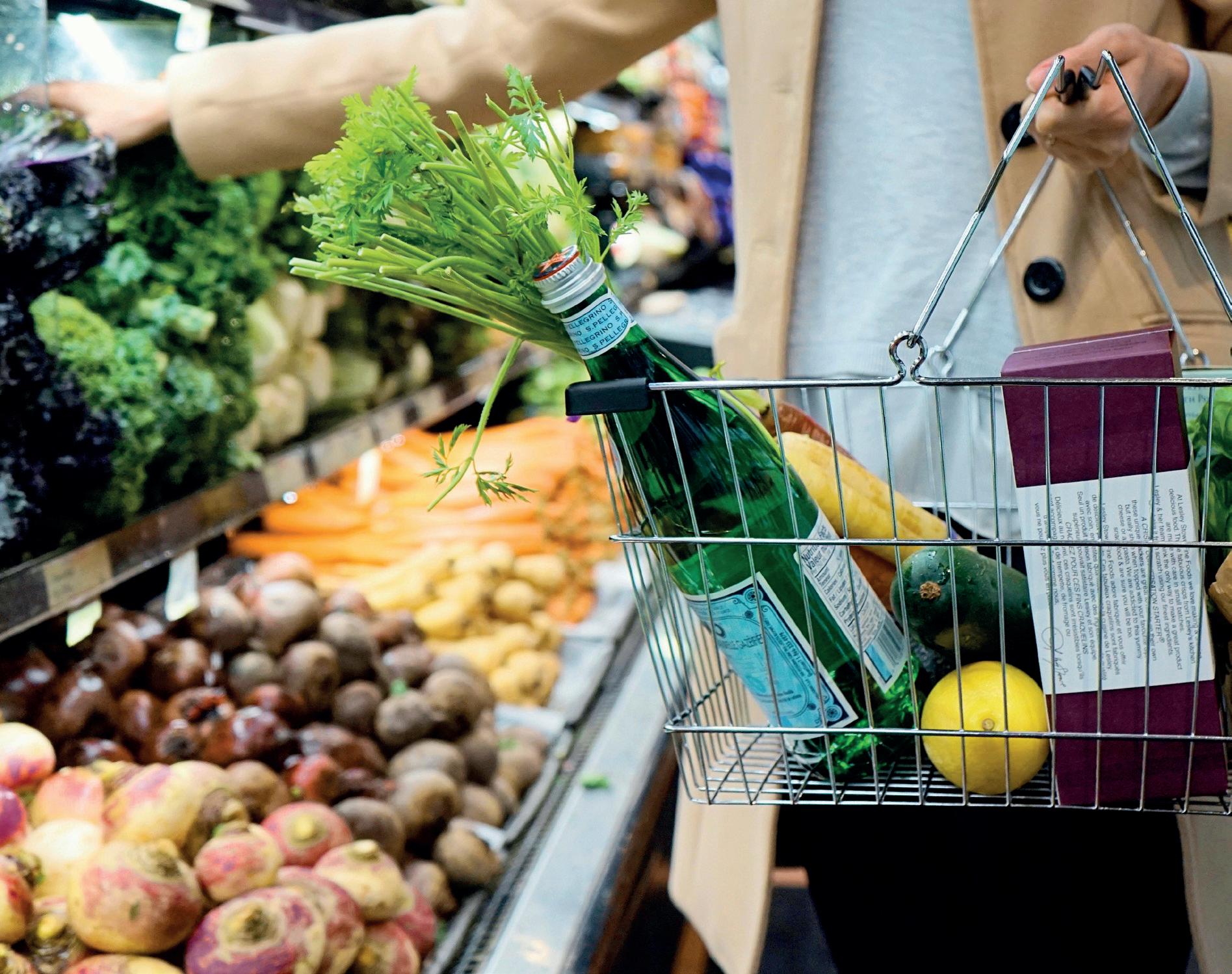
Organic food isn’t affordable, available and accessible to everyone in society. But it can be.
The Soil Association has recently released its annual Organic Market Report. Excitingly, the UK organic food and drink market is growing for the 12th consecutive year, despite the global political and economic turmoil and the cost-of-living crisis at home. The total market grew 2% in 2023, ending the year at £3.2 billion –almost double its value in 2011.
But the UK needs to catch up with much of the world with its ambition.
Compared to most nations around the world, the UK needs to catch up when it comes to organic. Only 3% of our farmland is organic, compared to over 10% on average across the EU, with some countries much higher.
Despite the UK not being a frontrunner when it comes to organic, public appetite for organic is there! Many people are starting to look for sustainably produced food that wasn’t grown using harmful chemicals, and they’re finding that the options just aren’t there. And if they are, they aren’t affordable.
In the coming years, the Soil Association plans to work with the entire organic sector to change this. Together, we can make organic affordable, available and accessible to all, with huge benefits for climate, nature, and health.
Valuing organic: Everyone from policymakers and retailers, to the public, must value organic for the many benefits it delivers – greater soil health, improved biodiversity, and better welfare for farm animals.
The current economy has failed to value and reward food and farming systems that are good for the planet, and the big polluters aren’t required to pay for the damage caused to the natural world. We need to rethink our economy to make it fit for the future, and the organic sector can play a crucial role in shaping what it could and should look like.
Supporting organic: The organic sector needs to be financially and practically supported to grow.
There are many ways to do this, but the Soil Association would like to see policies that incentivise nature-friendly farming and discourage damaging practices, robust standards that encourage innovation, and training for farmers looking to use more sustainable practices.
Organic agriculture is knowledgeintensive, and farmers need access to information, training, and support, whether new entrants or seasoned practitioners. We must amplify diverse and often marginalised voices and continue to learn from each other.
Make organic available: Organic must be widely available in retailers, local communities and public settings such as schools and hospitals.
We’ll be working closely with supermarkets to ensure that organic is at the forefront – expanding product offerings, positioning organic as a healthy and sustainable choice, and ensuring fair mark ups for farmers.
And, we’ll be supporting the growth of community-led initiatives like boxschemes and local gardens, that bring people closer to the source of their food and address inequalities in access to healthy organic food.
We’ve got a long way to go in making organic food affordable, available, and accessible to all. But we’re confident that we can make this happen with the support of the organic sector, and of course our members.
We’d love to hear your thoughts on how we can grow the organic movement, so do get in touch with any feedback.
With the General Election expected later this year, our policy team are working hard to influence party manifestos and shape the agenda of the new government to support a future that protects the health of people, nature and the planet.
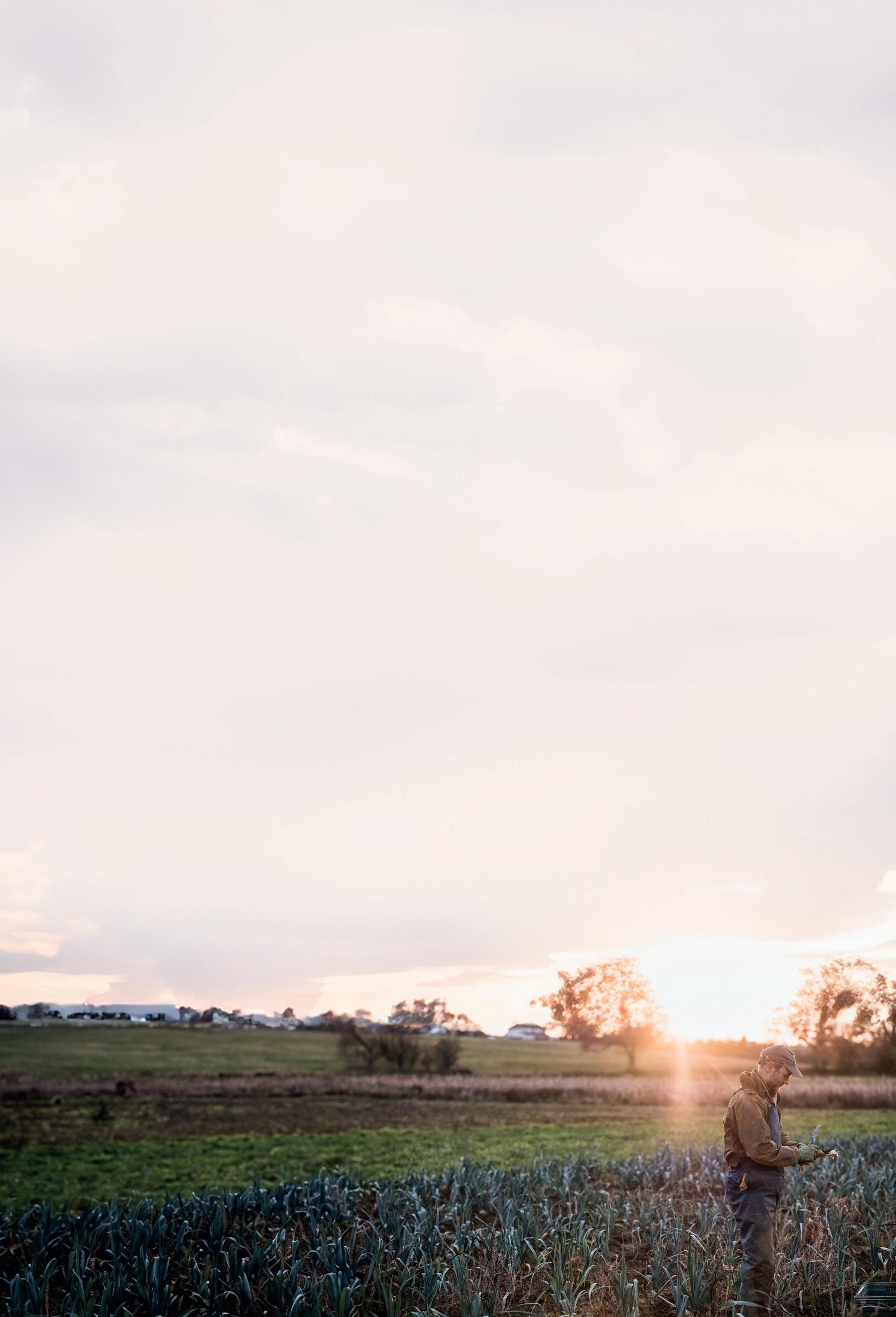
The need for sustainable farming has never been greater. Rising costs, low profit margins, unpredictable weather patterns and labour shortages mean that half of UK growers worry they could go out of business within 12 months. Meanwhile, UK wildlife and landscapes are at risk – only 14% of rivers are in good ecological condition, and 1 in 6 species of UK wildlife are threatened with extinction.
Nature-friendly farming has the potential to tackle these issues, and there are a growing number of farmers, growers and land managers already practicing more sustainable methods.
However, for more farmers to make the changes necessary to save our planet, stronger government support is needed. Ahead of the general election, here are some of our top asks for political parties to support our farmers and growers:
Organic farming has proven benefits for animal welfare, the environment and human health. However, organic food is currently a luxury not available to many, and supermarkets charge premium prices for organic products, meaning organic farmers are not fairly rewarded. This needs to change.
We’re continuing to campaign to make sure policymakers, supermarkets and consumers understand the benefits of organic, but the UK needs a strong strategy to make planet-friendly organic food an affordable option for everyone. We need the UK government to match, if not exceed Europe’s target for growing organic farming to 25% of farmed land by 2030.
Fruit and vegetables are essential for a healthy and sustainable diet, but UK growers are facing enormous challenges and many worry that they will go out of business within the year.
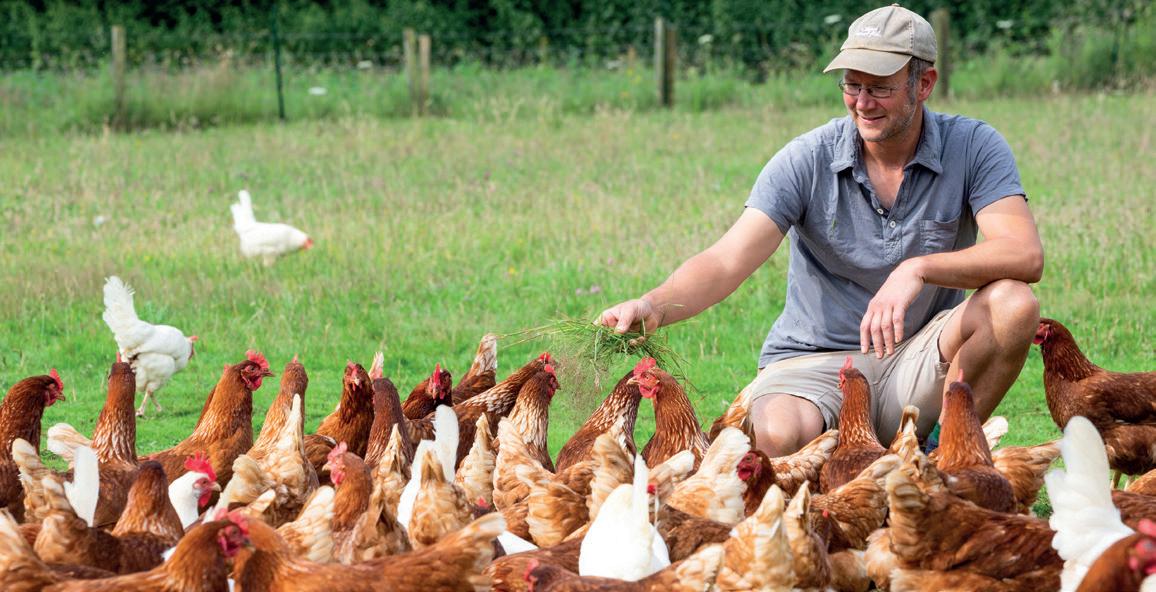
We’re championing UK growers through our Innovative Farmers programme – supporting growers to test naturefriendly farming practices on their farms and share learnings. We’re also supporting schools and hospitals to provide more fruit and veg – supporting UK growers in the process.
For the UK farmers and growers to have a secure future, Governments must provide stronger support for growers, with a horticulture strategy that champions nature-friendly practices.
Trees on farms improve soil health, support wildlife, protect rivers from runoff pollution, and help tackle climate change by storing carbon. They help protect farmland from extreme droughts and flooding, improving land productivity and protecting farms from our changing climate.
We’re advocating for farmers to plant and manage trees on farms in a sustainable way, but the Government needs to take firm action to create the ‘farmer-led tree revolution’ that the UK desperately needs.
We need public funding and regulation to support more trees on farms, and ambitious targets – 5% of farmland must incorporate trees by 2030, and 10% by 2040.
Intensive livestock production in the UK has harmful impacts on animal welfare, human health and the natural world. Overuse of antibiotics and chemicals used in animal feeds are just some of the issues. We know that sustainable livestock production can be part of the solution – for example cattle and sheep grazed on biodiverse pastures can benefit wildlife and soil health.
Governments must fairly reward farmers for practicing naturefriendly livestock farming – it must become the norm for animal welfare, low chemical use and biodiversity to be prioritised.
Every farmer should be supported to produce food in a way that protects the environment and ensures their farms are resilient and profitable. If we are to have any hope of tackling the climate crisis, protecting wildlife and supporting UK farmers, Governments must take steps to support UK farms and make naturefriendly farming a priority.
Read our full list of manifesto asks in our recent report, ‘The Time is Now’ soilassociation.co/timeisnow
This Level 3 regulated qualification, endorsed by the Biodynamic Association Board of Studies, aims to equip participants with the knowledge, skills and attitudes to become an independent and confident biodynamic practitioner.
The Growing the Land, Growing People course provides participants with the opportunity and competencies to work with people of differing educational and developmental needs in a therapeutic context through biodynamic, ecological activities.
Growing the Land, Growing People can be accessed through our charity volunteer scheme. Charity volunteers undertake this Level 3 qualification, whilst providing full-time, unpaid voluntary work. Charity volunteers receive Ruskin Mill Trust training, accommodation (if required), subsistence and expenses, and undertake the Ruskin Mill Biodynamic Training programme.

thefieldcentre.org.uk | info@rmlt.org.uk
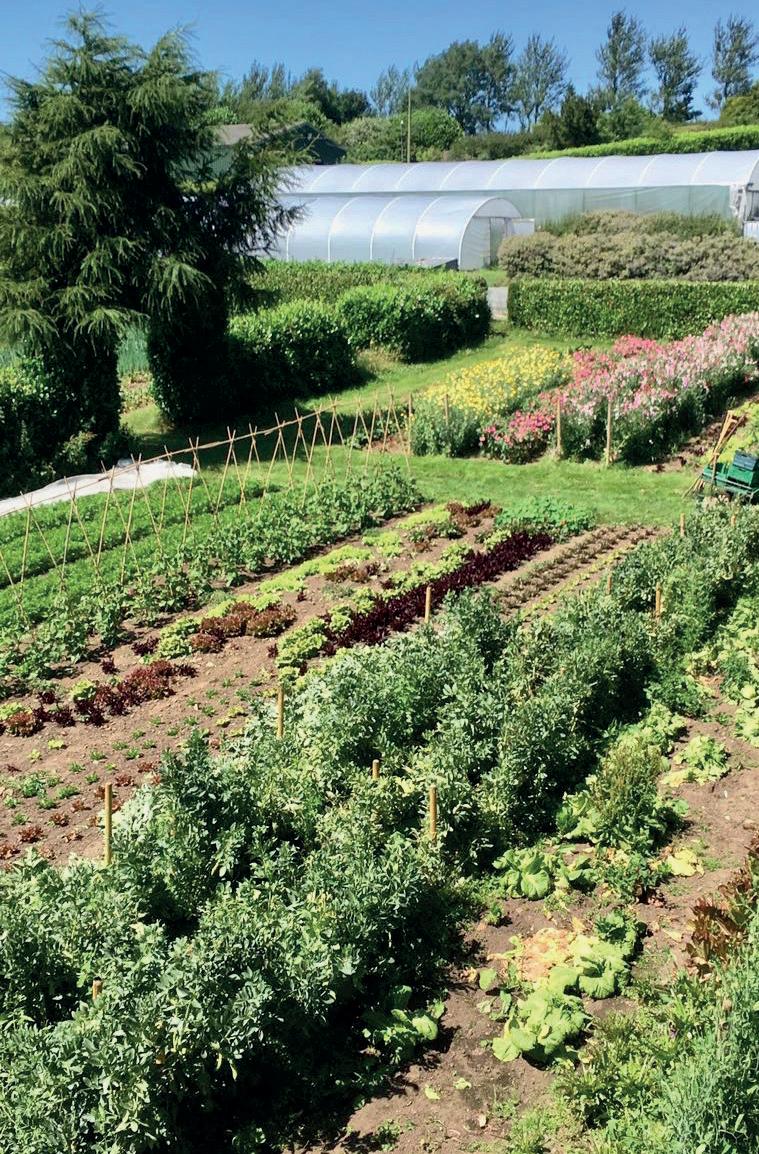
A biodynamic gardening course in partnership with the Biodynamic Association
Step-by-Step is an introduction to Biodynamic Gardening, which has enabled many people across the UK to learn and put into practice principles of biodynamics in their own gardens, benefitting both person and planet.
The new course will be held once a month on a Saturday. The course content is drawn from our rich Ruskin Mill Trust BD training that has been on offer for several years to staff, guests, volunteers and BD apprentices. By the end of the course, participants will:
• Understand the principles, intentions and basic methods of the biodynamic approach in the small garden setting
• Have a basic understanding of interactions in the natural world, including soil, plant, animal, human being and cosmos
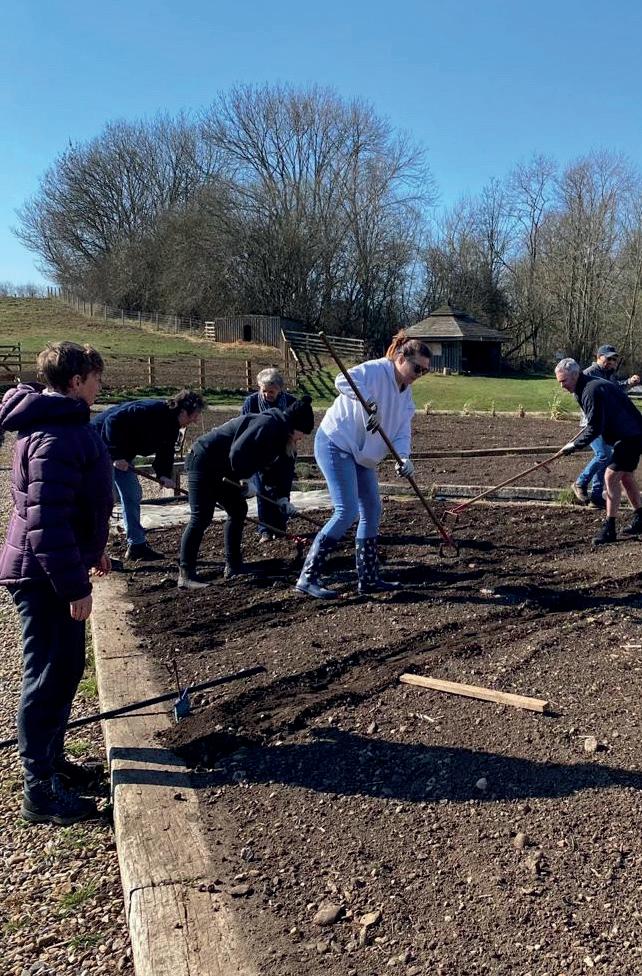

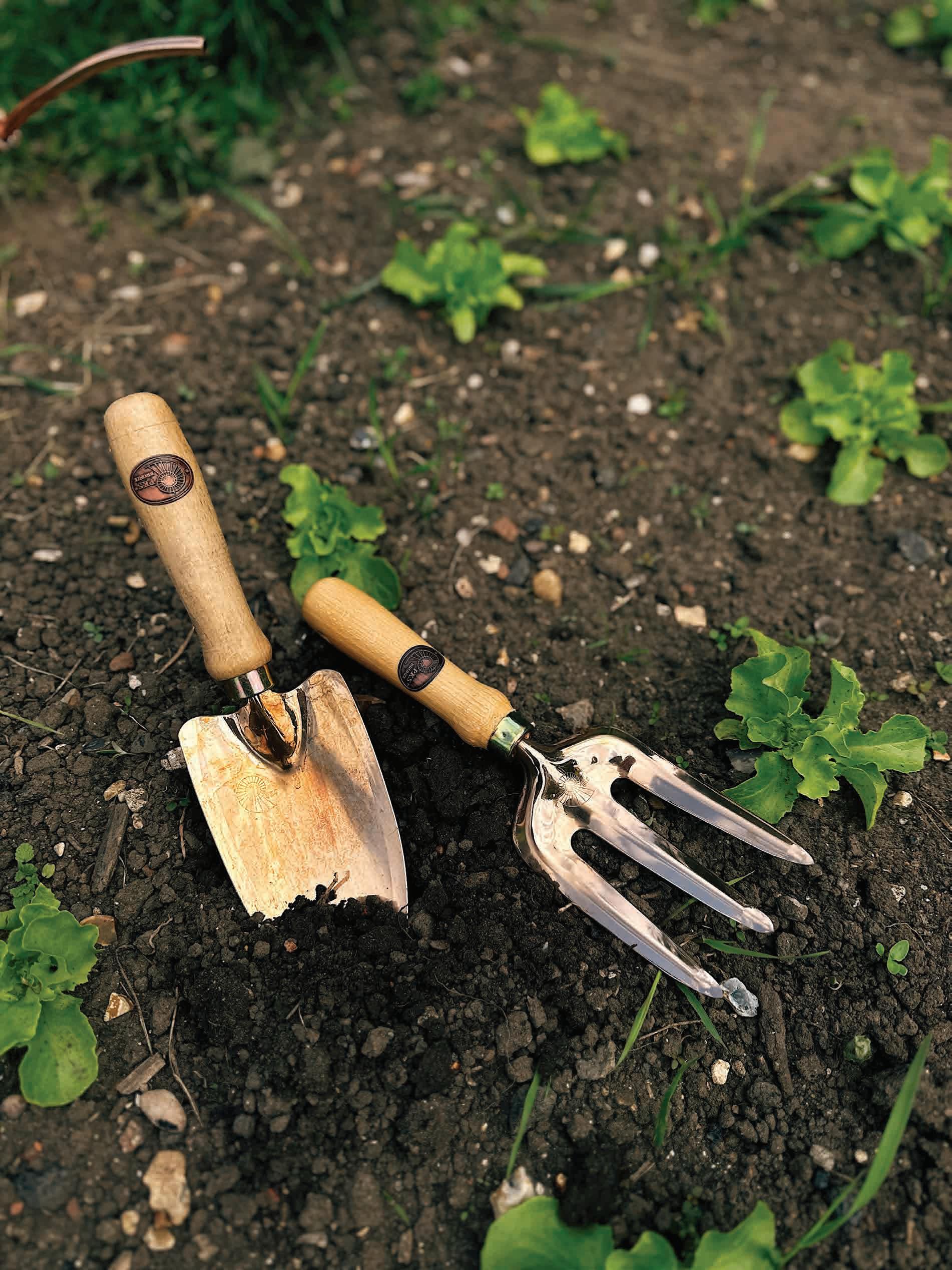
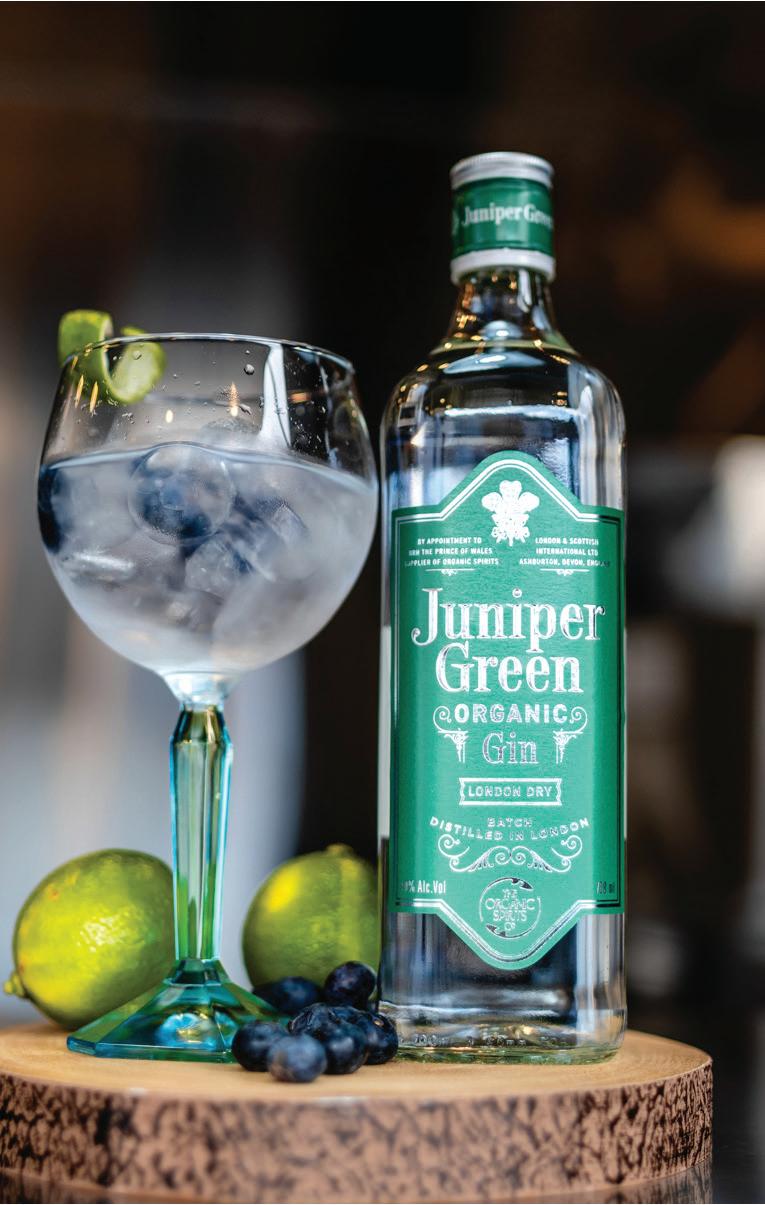
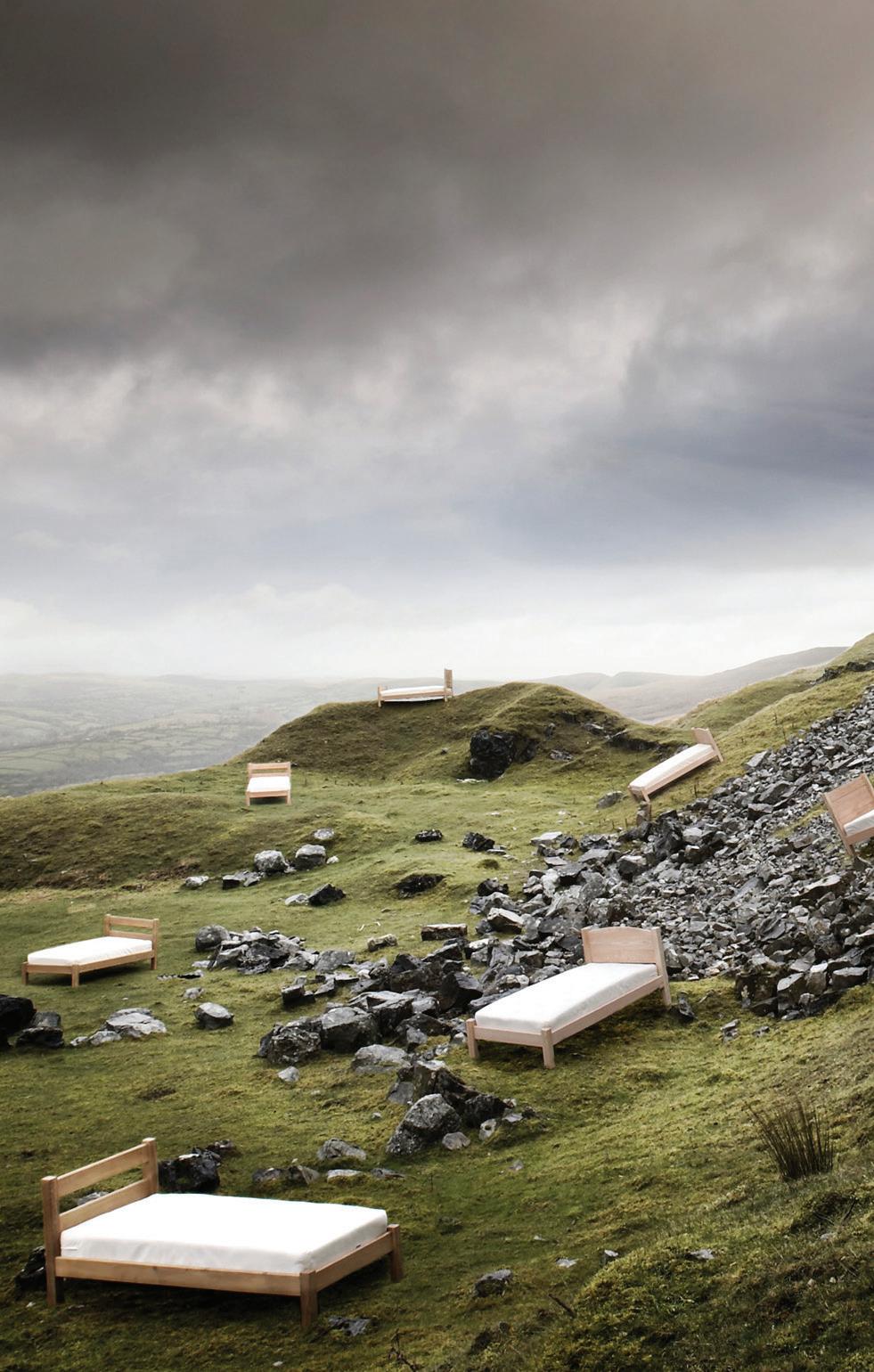

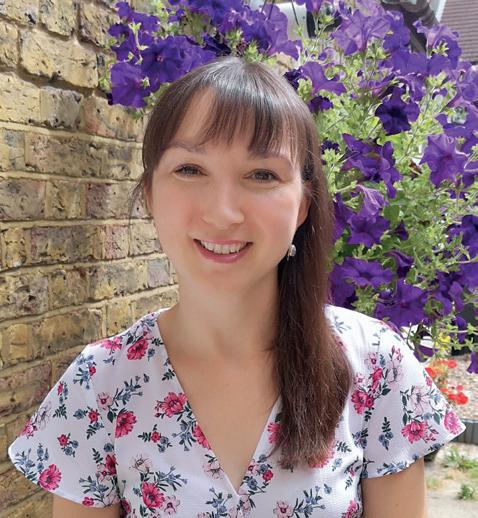
One of the Soil Association’s missions is to provide daily access to healthy and sustainable food that is good for the climate, nature, and health. We particularly want healthy and sustainable meals to be the norm for all children, with the opportunity for this to ignite a passion for good food that will last a lifetime.
Our Food for Life programme is key to making this happen, operating on the frontline with schools, nurseries, caterers, farmers and growers to connect children with the food they eat.
As Local Programme Manager for Food for Life Medway, Grace’s role is to support schools to get involved with cooking and growing and learning about where their food comes from.
Hi Grace, thanks for chatting to Living Earth. Can you start by telling our members what a typical day in your life looks like as a Local Programme Manager?
Where to start, no two days at work are the same! I work with 38 schools in the Medway area, from small rural primary schools to larger, more urban secondary schools, and support them to build connections with food into the school experience.
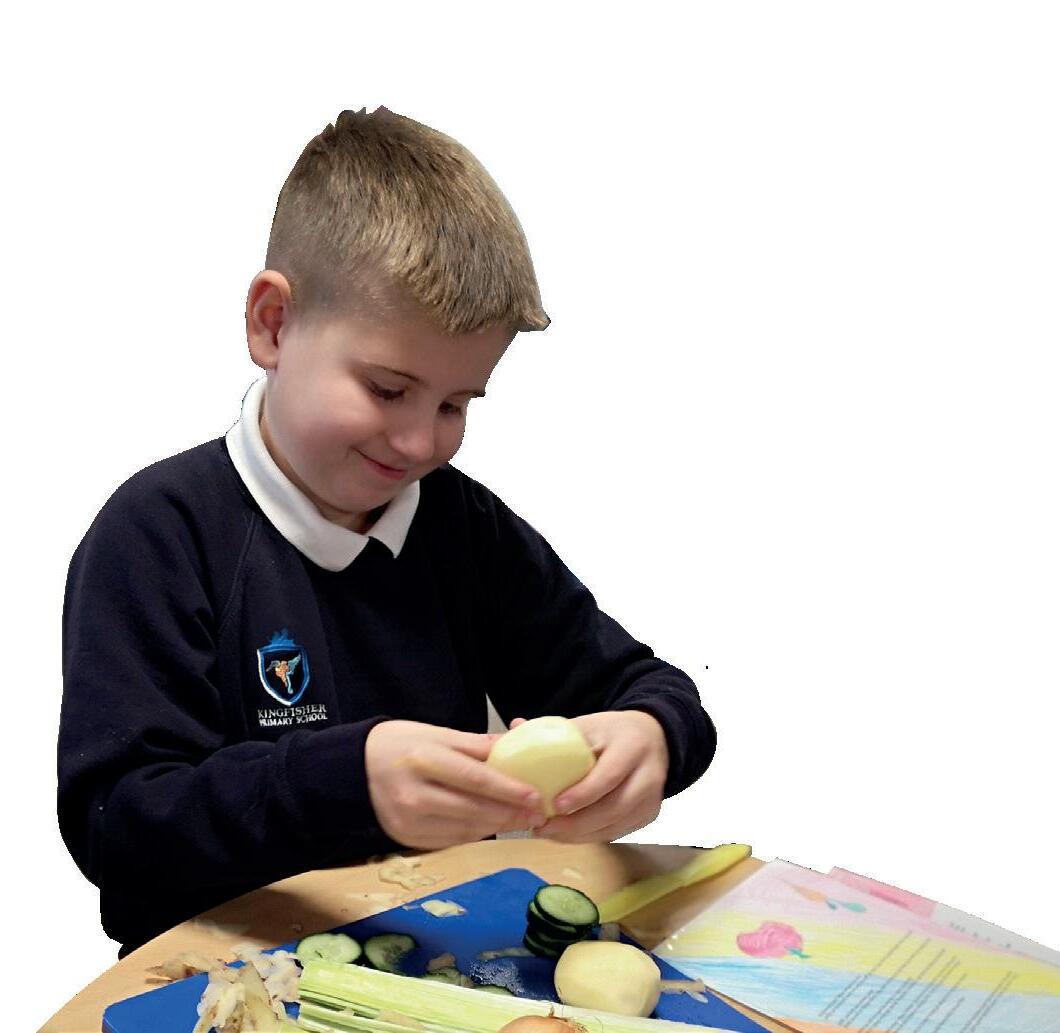
Every school I work with is different, so you can imagine that their goals for the programme are also very different. I work with them on an individual basis to understand what they are looking to achieve and provide them with training opportunities and resources to help them to succeed.
They might be looking to start a vegetable patch, organise afterschool cooking classes, or even improve the children’s experience in the dining room. We take a whole school approach, weaving
food into the curriculum, whether that’s in Food Technology, Geography, Science or History. There are so many opportunities!
I’m also really fortunate in Medway that I’ve got good relationships with Medway Council and other local organisations, so I can signpost schools to further support with eco or climate initiatives, or can organise farm visits to local producers, which are always popular!
Your role sounds very rewarding! What do you most enjoy about your work?
I’m lucky enough to be invited to the events that schools host, and that is absolutely the highlight for me. Seeing the excitement from pupils when they’re on a farm or seeing them show off the food they’ve cooked for their parents or carers using produce they’ve grown themselves is just brilliant!
And when you teach children about where their food comes from there’s a positive ripple effect for the community too. A school might start by creating a garden, but it evolves into parents and carers helping or a grandparent teaching students to make bird feeders. And that’s how change starts.
The parents want to talk about it, they’ll approach me at the gate and want to talk about the birds they’re seeing in the garden.
Medway School Teacher
Food for Life’s annual Plant & Share campaign is happening at the moment. How are schools in your community getting involved?
Plant and Share is Food for Life’s annual Spring campaign to encourage the nation to get growing! It runs throughout April, with weekly themes, resources and activities for schools to get involved in.
Lots of schools in Medway take part in Plant & Share. April is the perfect time to start sowing and sharing seeds and plants that will produce fruit and veg for everyone to enjoy before the holidays hit!
Last year, pupils told me they’d tried vegetables they never would have tried before! But responsibility for the plants, watching them grow from seeds, and battling slugs meant that they were open to trying something new.
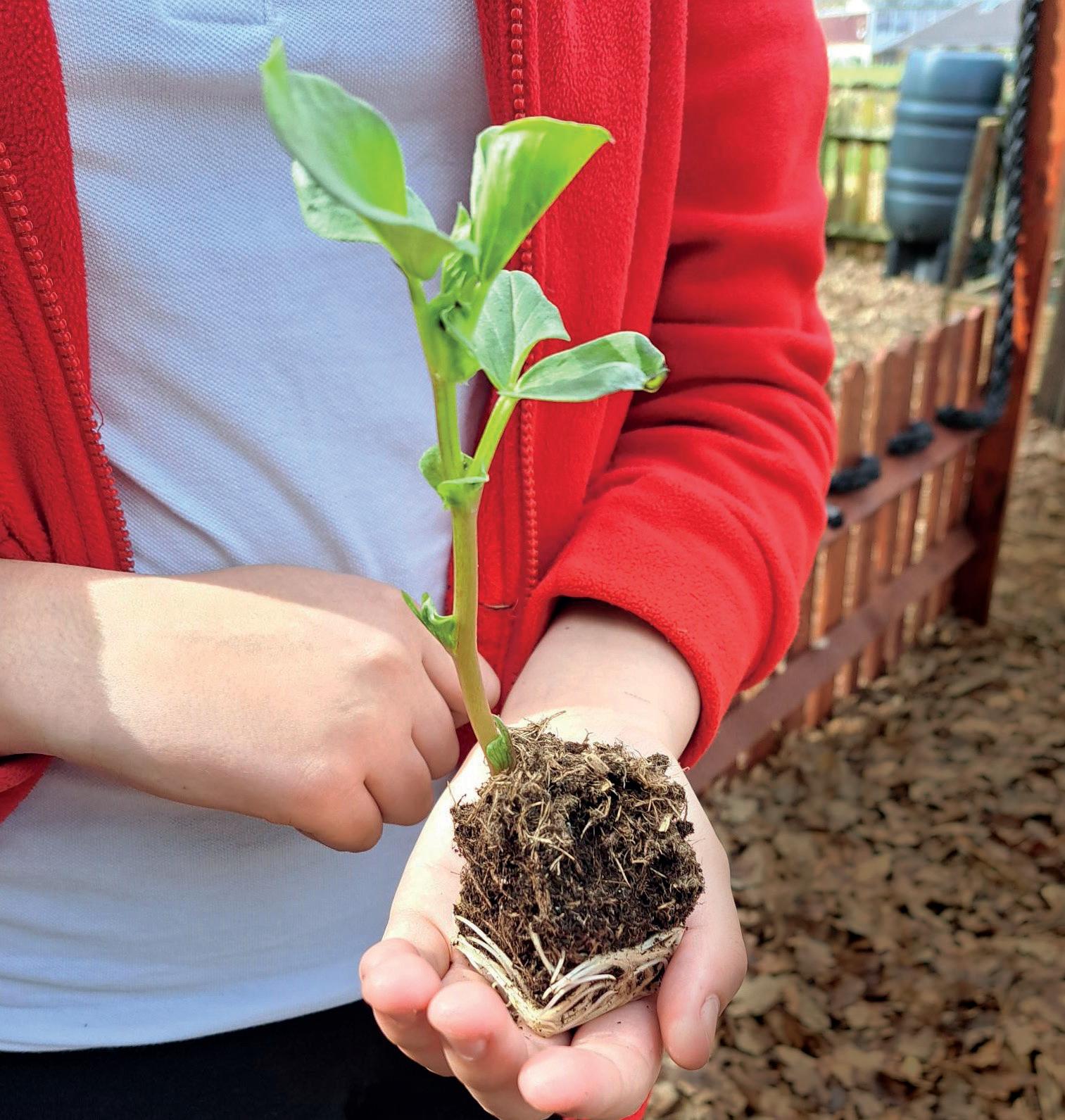
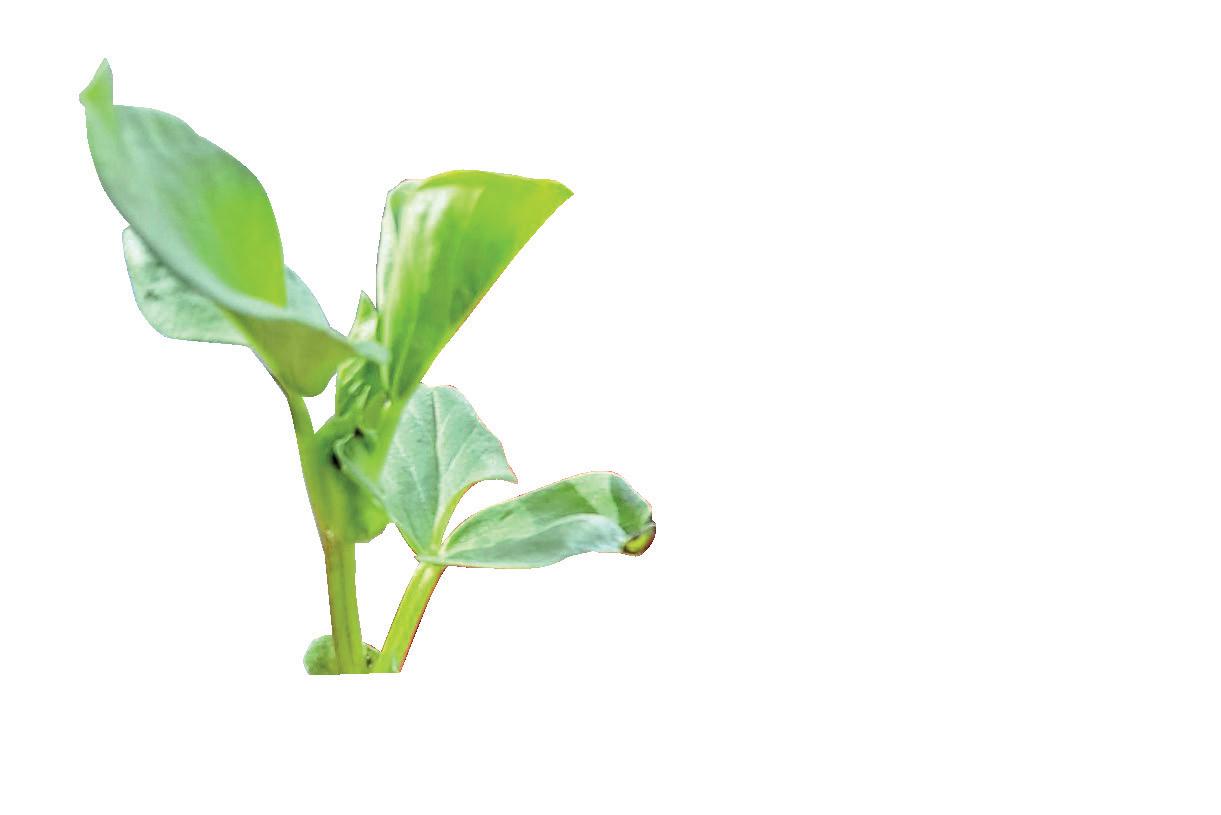
The Flow: Rivers, Water and Wildness, Amy-Jane Beer
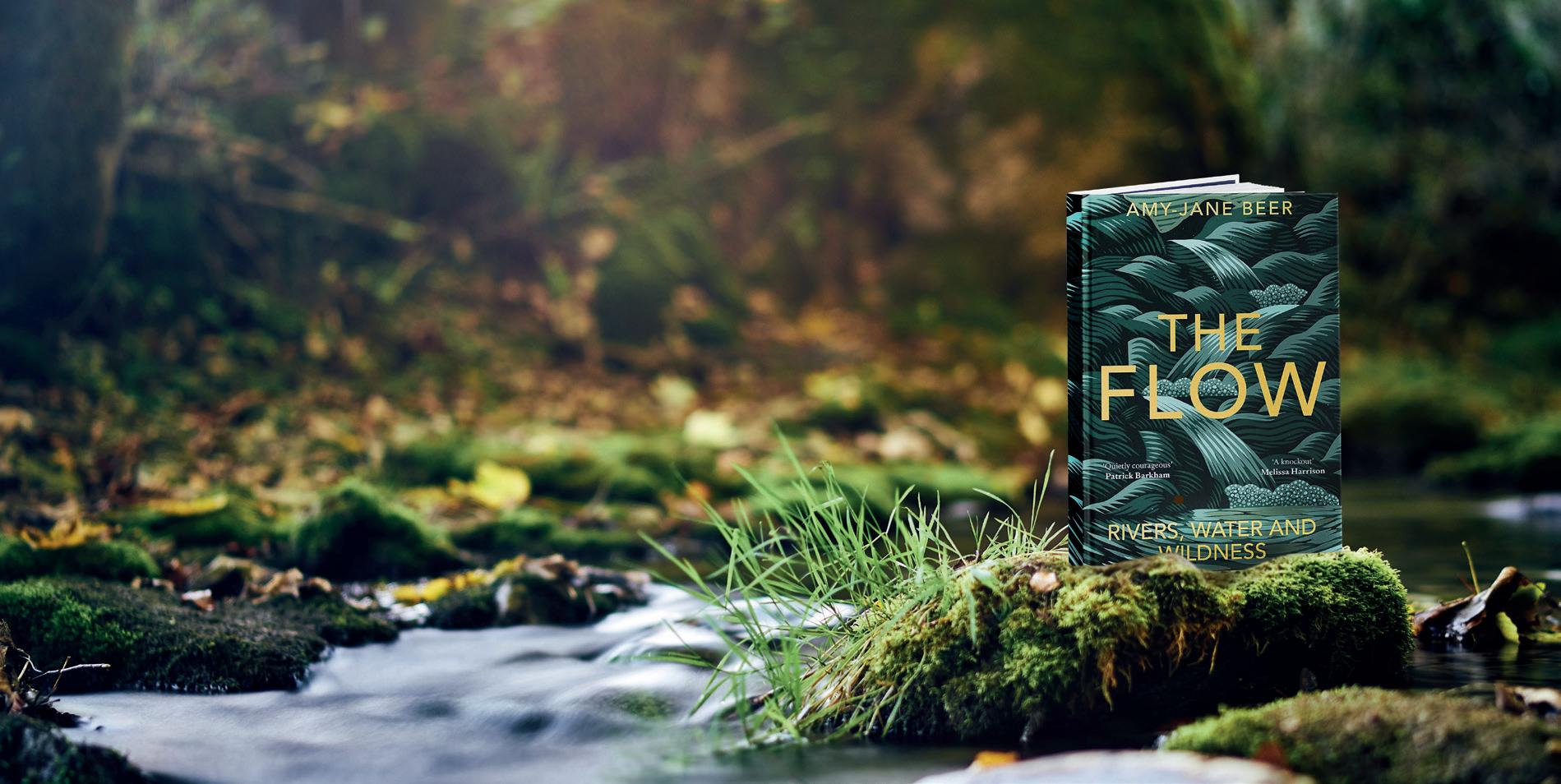
If you’ve found yourself wanting to learn more about our rivers, you’re in luck! Our book recommendation for this issue is The Flow.
A visit to the rapid where she lost a close friend in a kayaking accident unexpectedly reignites Amy-Jane Beer’s love of rivers, setting her off on a journey of exploration and connection to the natural world.
Although this book starts with a tragic accident, don’t be put off. Dive into The Flow and you’ll learn about the cultural significance of rivers in the UK, their ecological importance, mythology, and even political questions like ‘what is a river?’.
In her book, Amy-Jane meanders across the UK waterways, from the
chalk rivers of Yorkshire to the salmon highways of Scotland, following springs, streams and rivers from source to mouth. Along the way, she speaks to people from across Britain, collecting their stories and knowledge about their local river and the humans and wildlife that rely on it.
The Flow is a celebration of rivers, with a warning that we must all take action to restore them to a healthy state. Amy-Jane inspires a sense of responsibility for our rivers and the desire to protect them. We can’t recommend this book enough!
If you’re enjoying our book recommendations, or would like to share any book ideas, please do get in touch! We’re always happy to hear from our readers, so please do share any books you’ve read that have changed the way you think about your food, farming or the natural world.
Email: memb@soilassociation.org

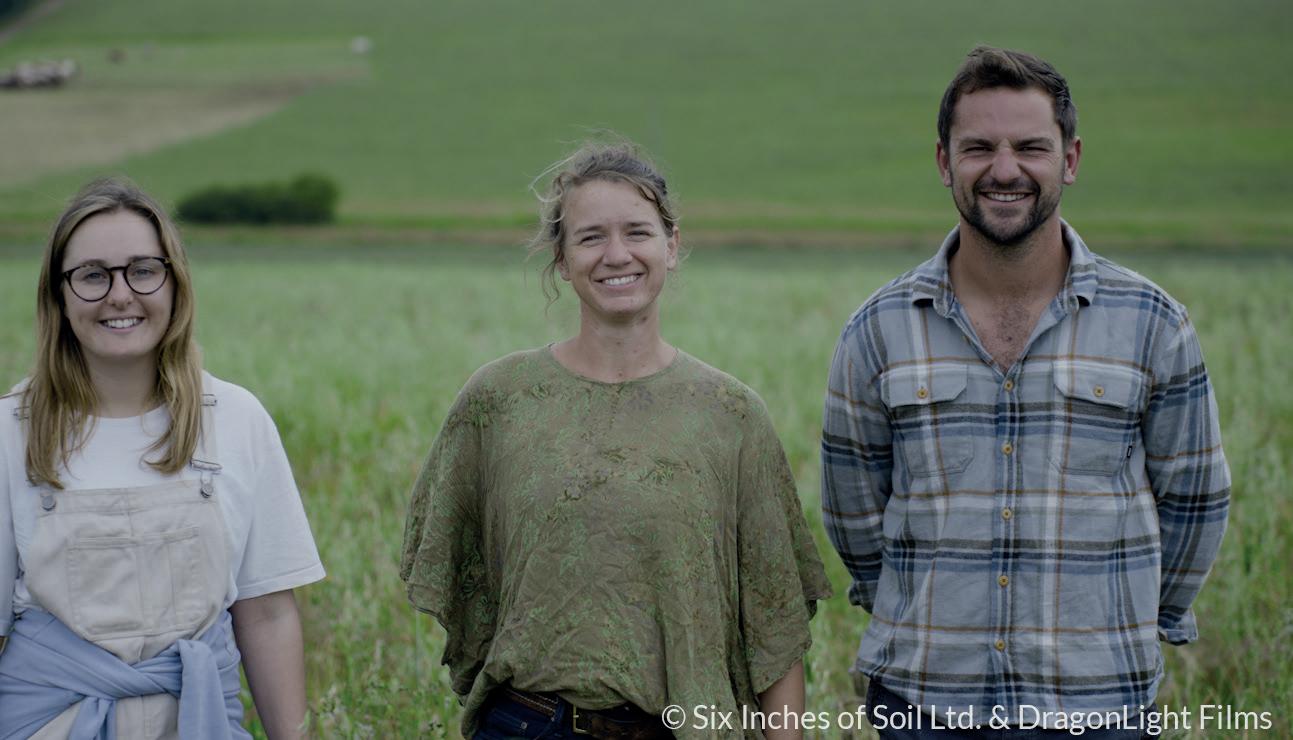
Did you know that we only have 6 inches of topsoil? Vital for growing food!
Six Inches of Soil is the inspiring story of British farmers standing up against the industrial food system and transforming the way they produce food – to heal the soil, benefit our health and provide for local communities.
The film follows three new farmers on the first year of their regenerative journey - Anna Jackson, a Lincolnshire 11th generation arable and sheep farmer; Adrienne Gordon, a Cambridgeshire small-scale vegetable farmer; and Ben Thomas, who rears pasture fed beef cattle in Cornwall.
The farmers, and audience, learn about the benefits of nature-friendly farming from scientists, farmers and campaigners, who are passionate about farming in a way that works with nature, not against it.
Six Inches of Soil is a real celebration of how regenerative farming principles,
including organic, can help tackle the climate, nature and health crises. This method of farming promotes healthier soils, restores biodiversity, and provides more nutritious food.
If you’re interested in watching
Six Inches of Soil, screenings are happening across the UK, with more still to be announced.
You can see screenings by going to sixinchesofsoil.org/screeningdates, or even set up your own.
The Soil Association is proud to be a partner on the Six Inches of Soil film.
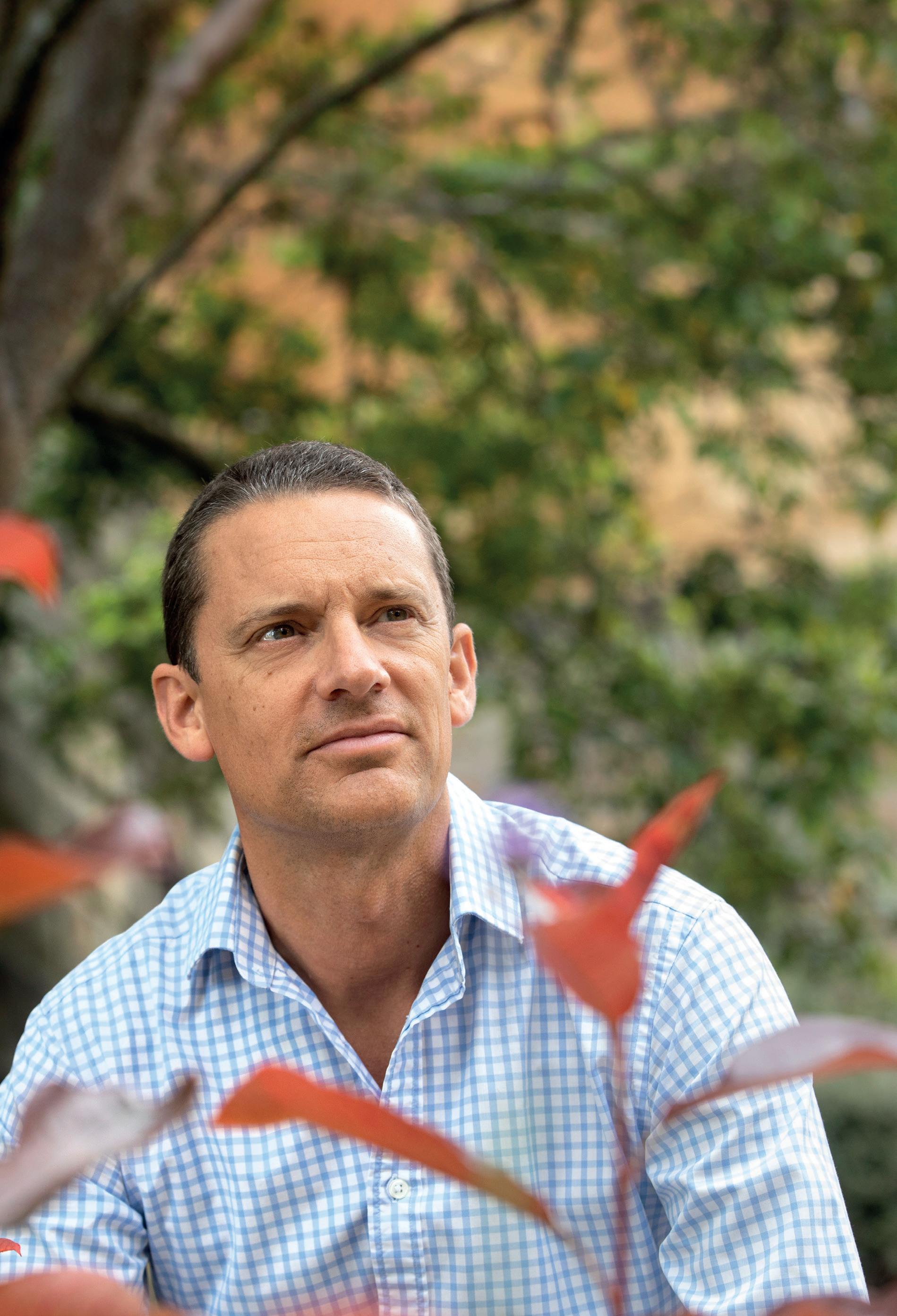
Triodos Bank CEO, Bevis Watts, discovered a family of wild beavers thriving on the River Avon near Bath in 2021 whilst on a month-long sabbatical. He was the first to spot beavers in the area in over 400 years!
We’d like to say a huge thank you to Triodos Bank, one of our longest-standing charity partners, who we have been working alongside for a whopping 25 years!
Over the course of our partnership, Triodos Bank has played an important role in the work of the Soil Association. In fact, it has donated well over £600,000 to our cause, alongside sponsoring events and publications. We feel very lucky to be partnered with an organisation that shares our vision of a world in harmony with nature and the climate.
Let’s take a look back at what the Soil Association has achieved in the last 25 years with help from our partners:
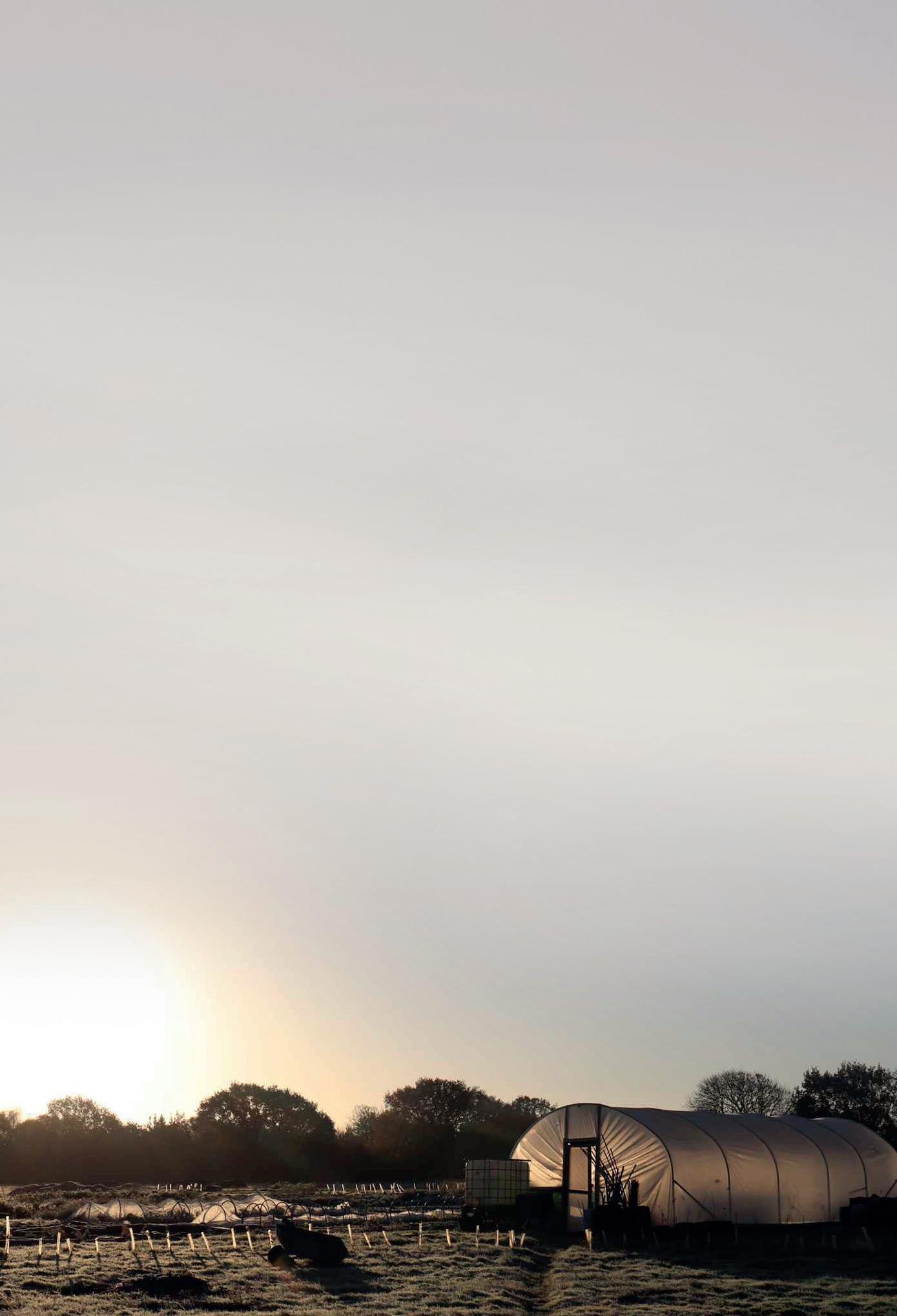
Soil Association succeeded in getting the EU to ban a number of antibiotic feed additives, to protect food standards and improve animal welfare.
Food for Life was founded by Jeanette Orrey. Today, the programme serves over 2 million healthy and sustainable meals in schools every day.
Innovative Farmers was launched, supporting farmers to find solutions to challenges on farms and explore sustainable methods that work with nature rather than against it.
We campaigned for a ban on the use of neonicotinoids, pesticides that cause irreversible damage to pollinators. We were successful!
Our Taking the Biscuit campaign shone a light on ultra-processed foods, particularly how the Government’s own health app promotes many harmful foods.
Homeowners wanted to help save the planet, one house at a time ACT NOW!
Homeowners wanted to help save the planet, one house at a time ACT NOW!
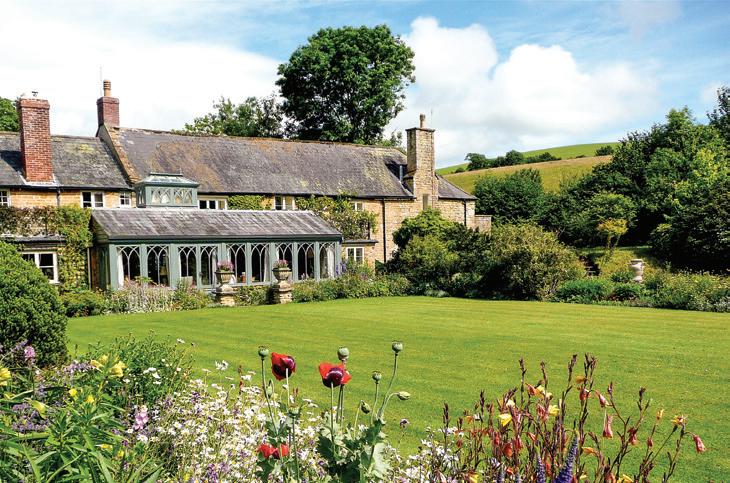
Every day we help owners of period and listed properties make their homes warmer and greener.
Every day we help owners of period and listed properties make their homes warmer and greener.
We’ve insulated 650 homes, saving 13,000 tonnes CO2 and helped our customers save up to 50% on their heating bills. But there’s lots more to do.
We’ve insulated 650 homes, saving 13,000 tonnes CO2 and helped our customers save up to 50% on their heating bills. But there’s lots more to do.
Heating our homes is a major contribution to the production of greenhouse gases. And if you live in a listed or period property you’ll know the financial costs too. Our advanced secondary glazing, draught-proofing and loft insulation reduces heat loss by up to 40% in a detached property and 50% in a mid-terrace.

Heating our homes is a major contribution to the production of greenhouse gases. And if you live in a listed or period property you’ll know the financial costs too. Our advanced secondary glazing, draught-proofing and loft insulation reduces heat loss by up to 40% in a detached property and 50% in a mid-terrace.
Imagine, a warmer home costing less to heat and lower greenhouse gas emissions. That’s positive change.
Imagine, a warmer home costing less to heat and lower greenhouse gas emissions. That’s positive change.
Call us on 01237 429826 to request an estimate or free survey. We’d love to hear from you.
info@mitchellanddickinson.co.uk mitchellanddickinson.co.uk
Call us on 01237 429826 to request an estimate or free survey. We’d love to hear from you. info@mitchellanddickinson.co.uk mitchellanddickinson.co.uk


Explore the Wiltshire countryside. Reconnect with nature on our wildlife friendly farm. Enjoy campfires, outdoor cooking, a wood-fired pizza oven and luxury off-grid facilities.
www.greatcotmarshfarm.co.uk

Homeowners wanted to help
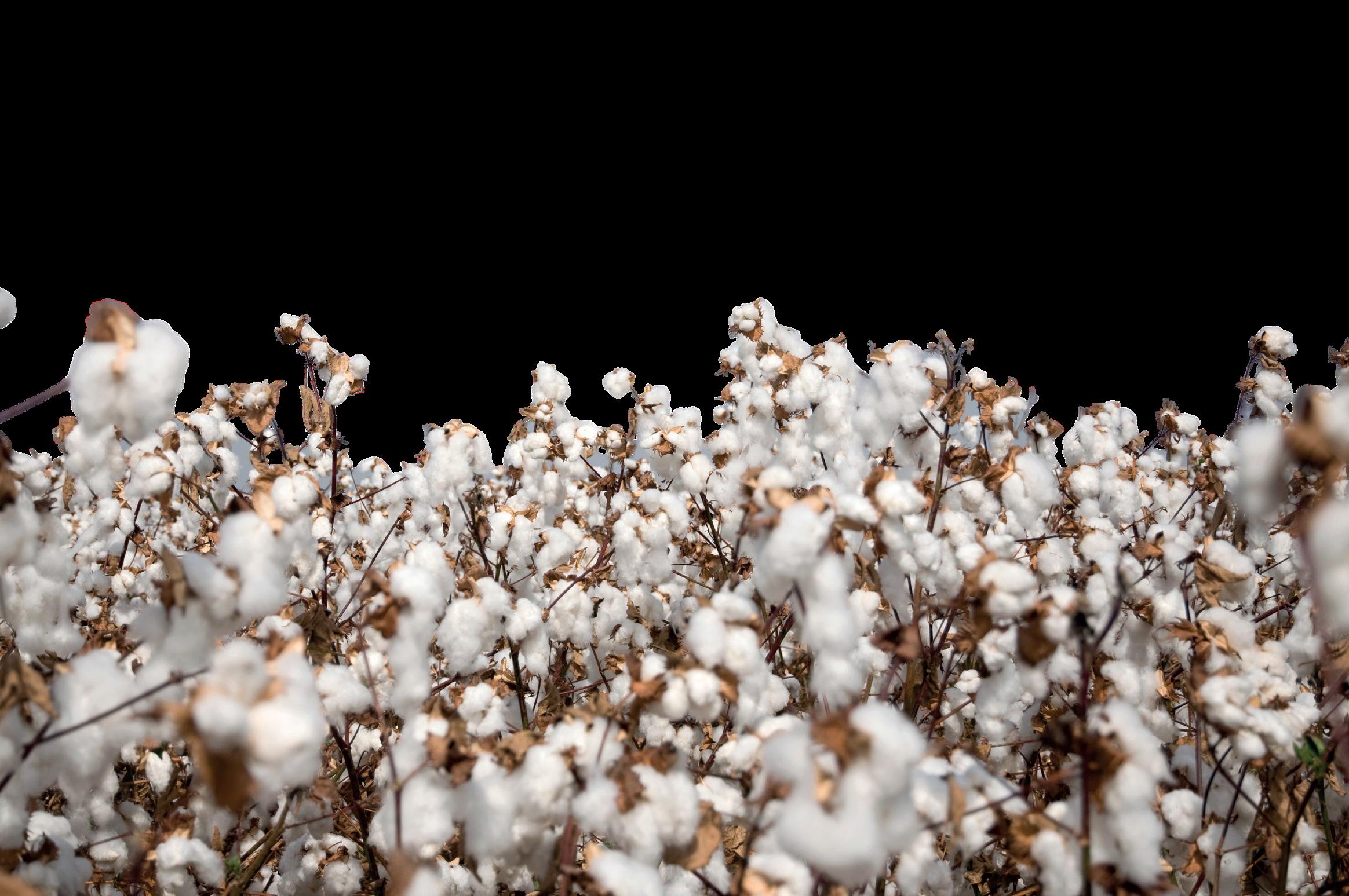






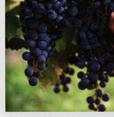



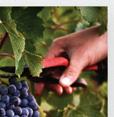

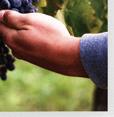



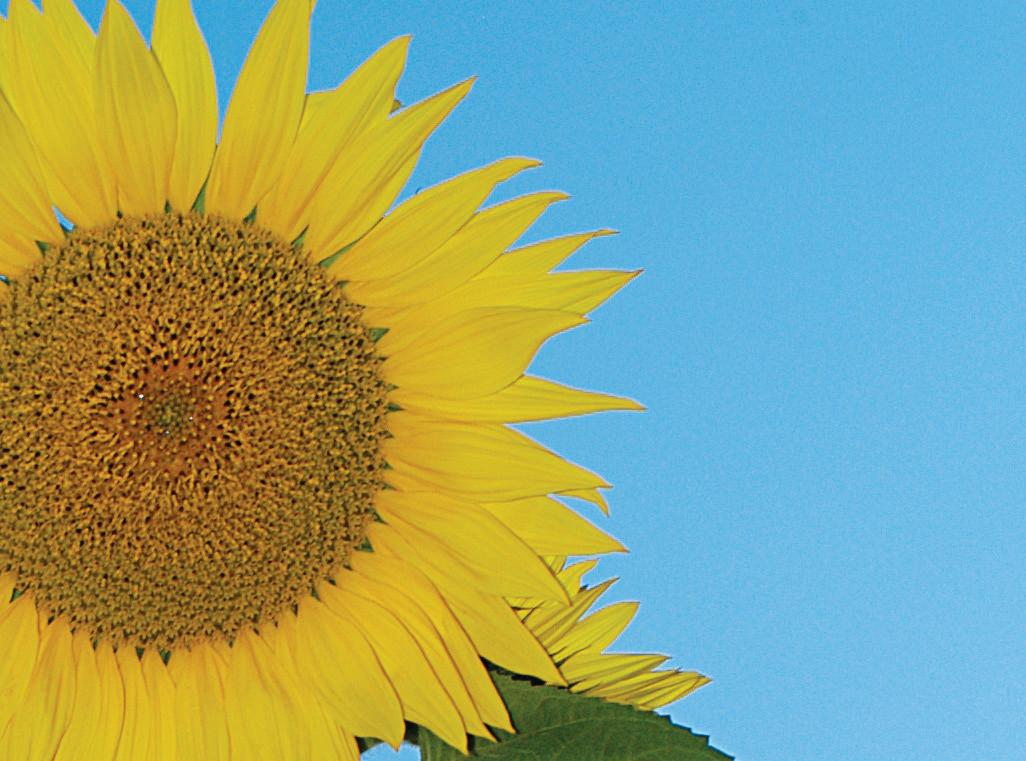
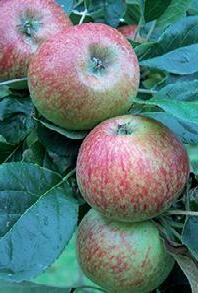


www.walcotnursery.co.uk Phone,Orderby Post
Organic Apple Trees
Over 500 varieties
Organic Apple Trees
Over 500 varieties

Herons Folly Garden
Fletching Street, Mayfield East Sussex, TN20 6TE
Herons Folly Garden
www.heronsfollygarden.co.uk
55 x 85 Ranger 15.qxp_60 mm x 88 mm 02/12/2015 14:42 Page 1
Fletching Street, Mayfield East Sussex, TN20 6TE
www.heronsfollygarden.co.uk

Lazy Dog Tool Co
www.lazydogtools.co.uk
Visit our website and buy our tools online. See our Defra report on hand-work and tools, ideal for use in wild flower meadows.
See our report to DEFRA, visit our website or buy on-lin our new ‘Manx Hoes’, prize trowels and other handtools. Or speak to us 01751 417351
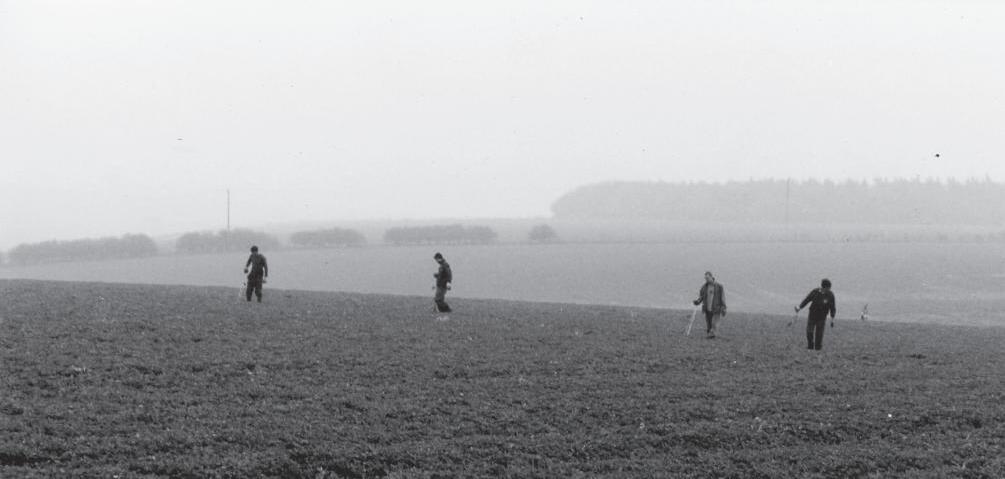
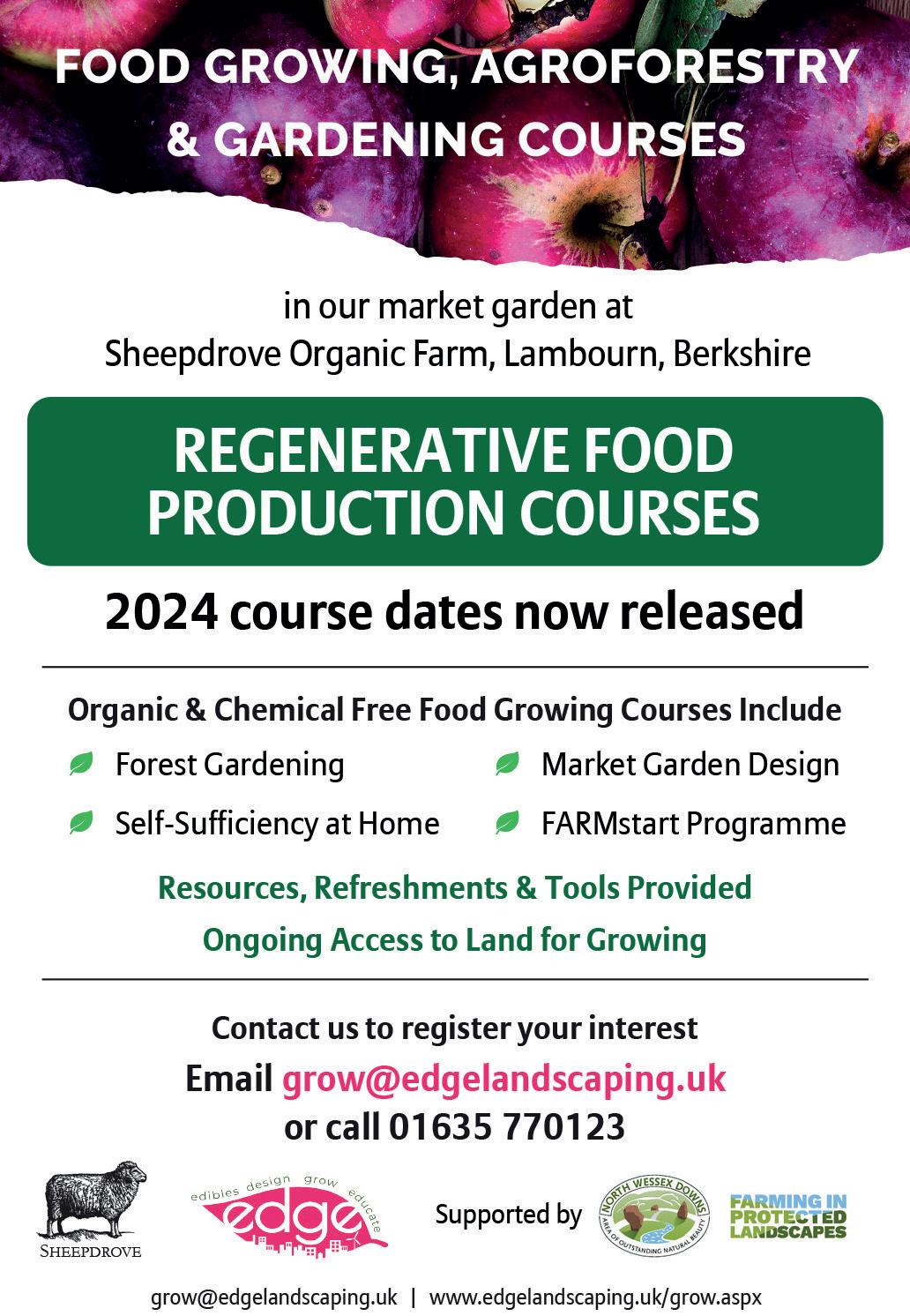



The best tools for clearing Docks, Thistles & Ragwort, are still made in YORKSHIRE.
The best tools for clearing Docks, Thistles & Ragwort, are MADE IN YORKSHIRE.
Tel: 01751 417351 email: hilltoporders2@gmail.com

www.organicpullets.co.uk
Lohmann Brown Classic, Isa Brown, Redco, White Leghorn (white eggs), Rhode Rock, Barred Rock, Utility Light Sussex, Cuckoo & Copperhead Maran, Blues & Emeralds (blue eggs).
Khaki Campbell ducks reared to order.
Any age, any quantity, delivery possible

Organic & Vegan blend of plantbased ingredients to help you support a healthy lifestyle



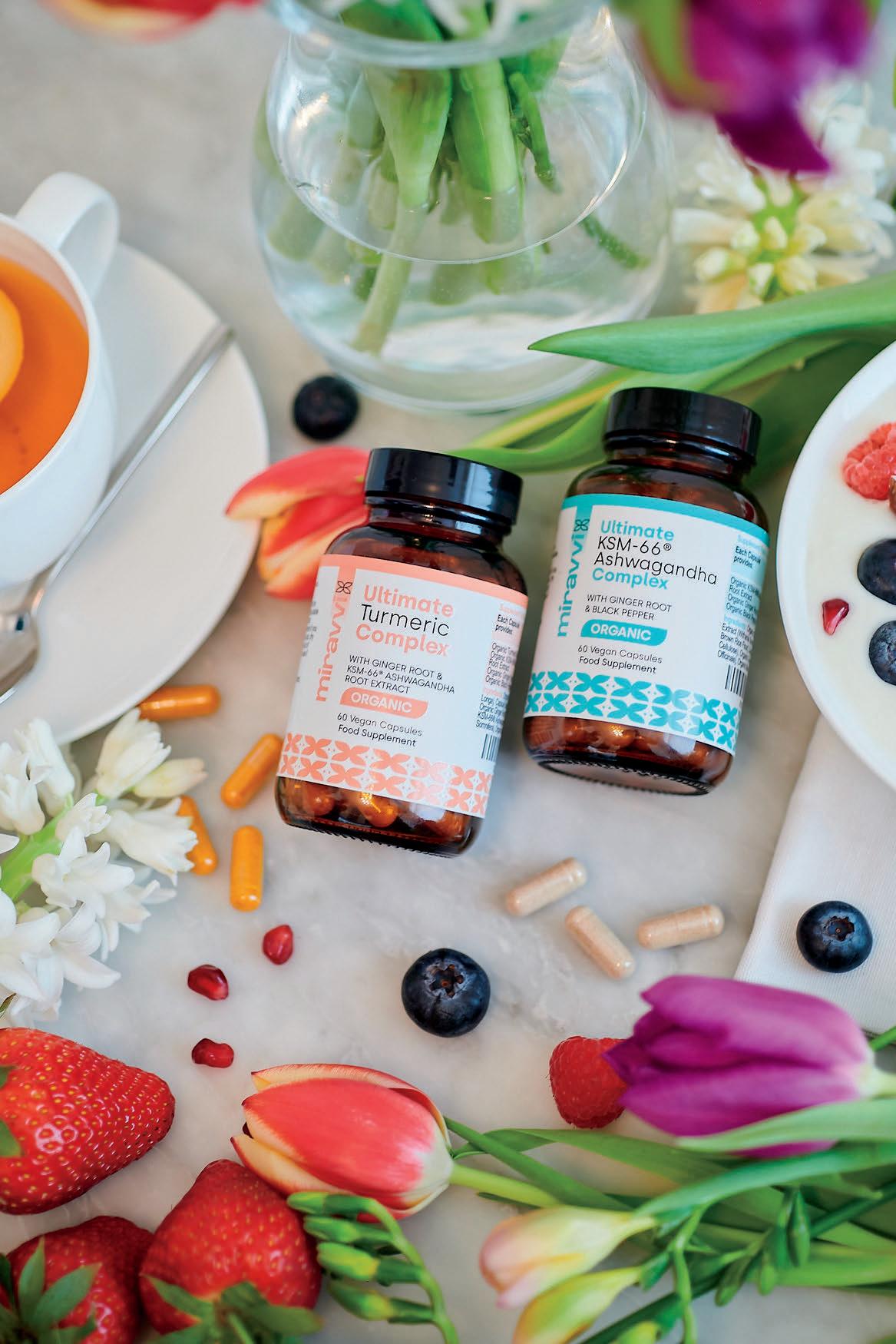

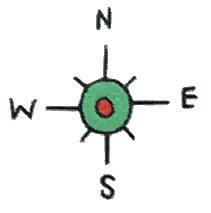
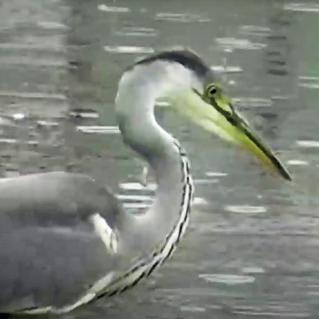

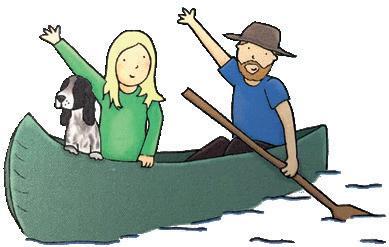

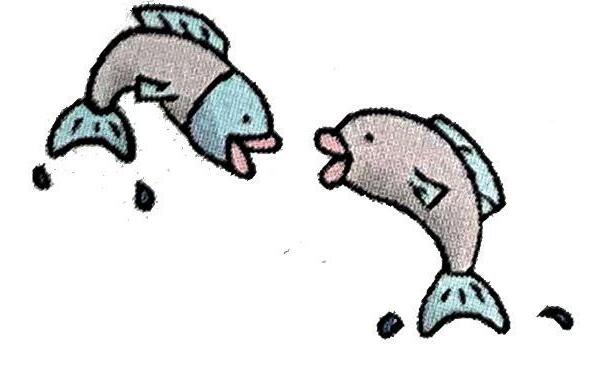

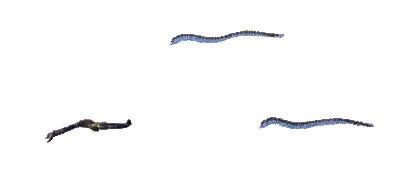
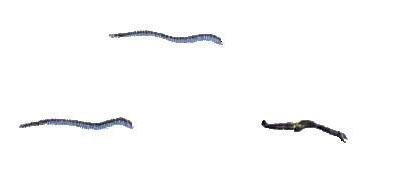




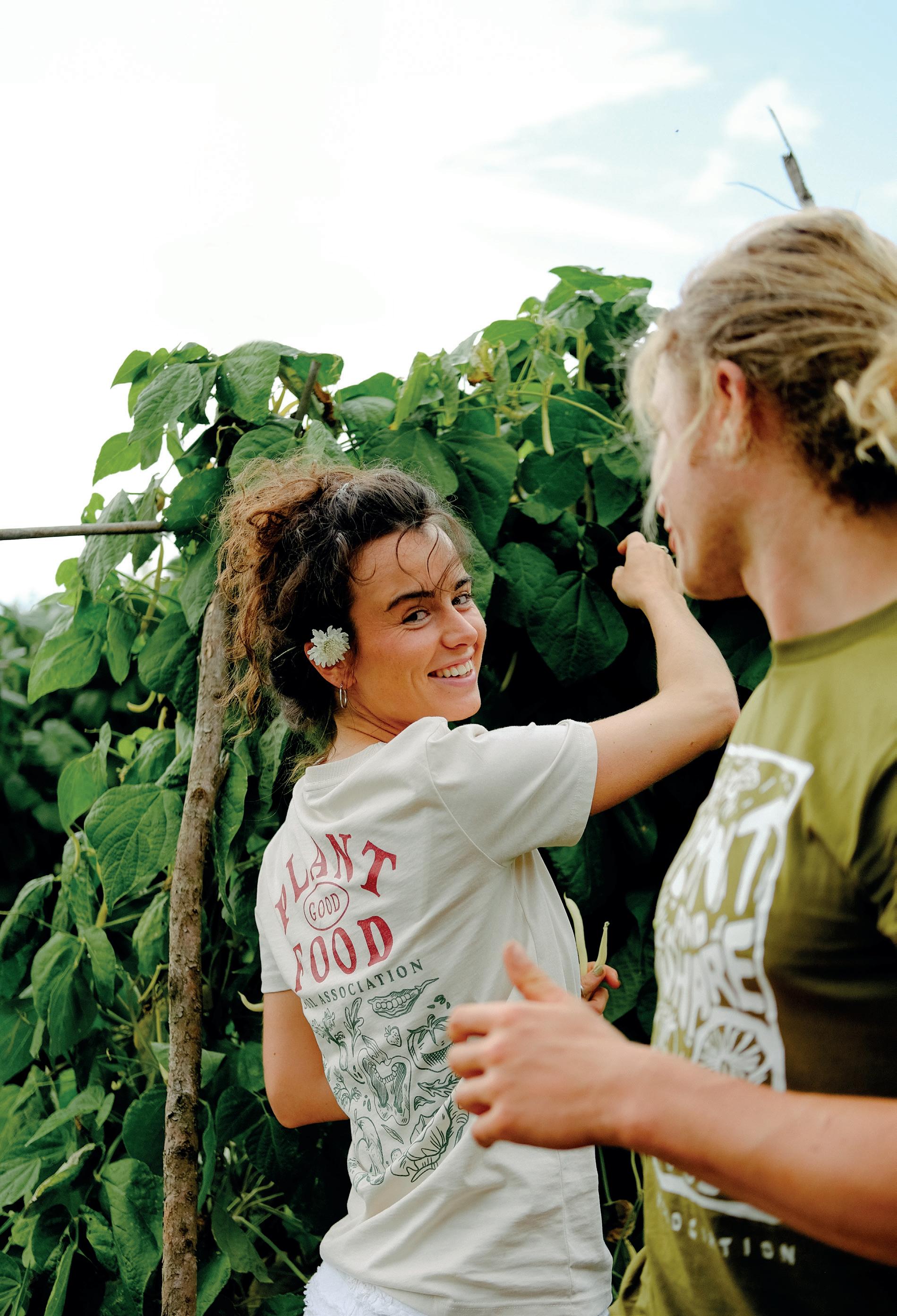

We’ve launched a new line of organic cotton clothing, inspired by 75+ years of Soil Association history. With retro designs plucked from our archive, they are a fantastic way to support our work and inspire others to do the same!
Shop now at soilassociation.co/merch